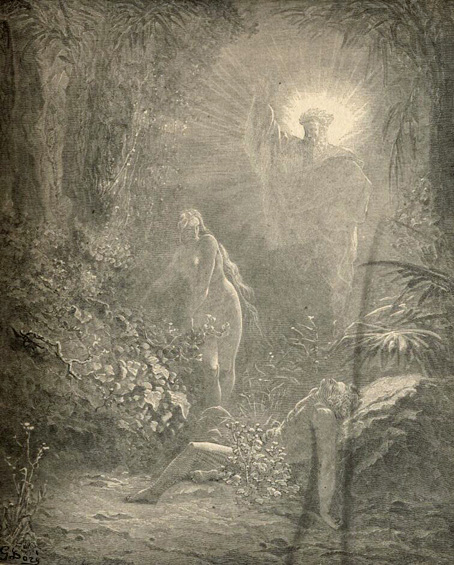

Genesis ii, 18, 21-24.
In these few words the Scriptures narrate the creation of thefirst mother of our race. In "Paradise Lost," the poetic geniusof Milton, going more into detail, describes how Eve awoke to consciousness, and found herself reposing under a shade offlowers, much wondering what she was and whence she came. Wandering by the margin of a small lake, she sees her own formmirrored in the clear waters, at which she wonders more. But avoice is heard, leading her to him for whom she was made, who lies sleeping under a grateful shade. It is at this point theartist comes to interpret the poet's dream. Amid the varied and luxurious foliage of Eden, in the vague light of the early dawn,Eve is presented, coy and graceful, gazing on her sleeping Lord,while in the background is faintly outlined the mystic form ofHim in whose image they were created.
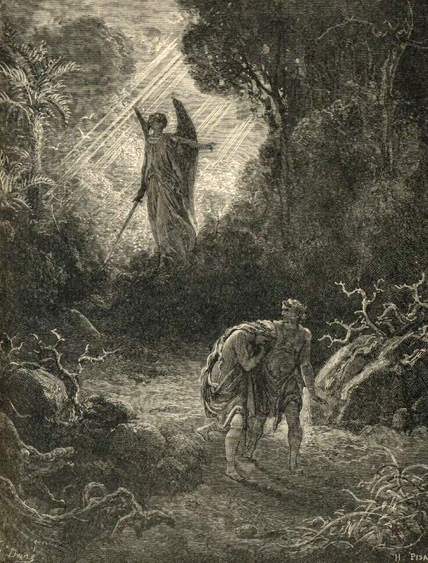
Genesis iii, 22-24
They, looking back, all the eastern side beheld Of Paradise, so late their happy seat, Waved over by that flaming brand; the gate, With dreadful forces thronged, and fiery arms Some natural ears they dropped, but wiped them soon; The world was all before them, where to choose Their place of rest, and Providence their guide; They, hand in hand, with wandering steps and slow, Through Eden took their solitary way.
Paradise Lost, Book XII
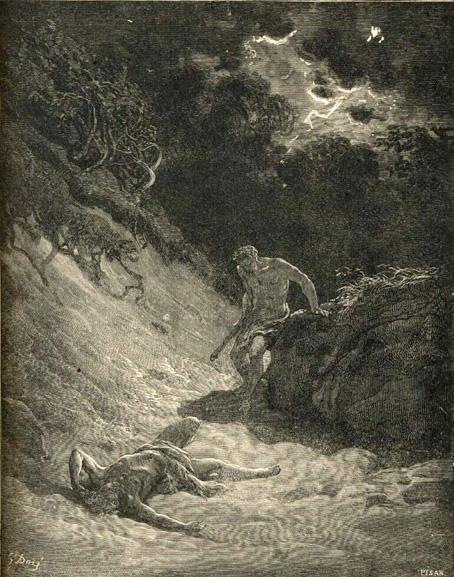
And the Lord said unto Cain, Where is Abel thy brother? And he said, I know not Am I my brother's keeper? And he said what hast thou done? The voice of thy brother's blood crieth unto me from the ground. And now art thou cursed from the earth, which hath opened her mouth to receive thy brother's blood from thy hand; when thou tillest the ground, it shall not henceforth yield unto thee her strength; a fugitive and a vagabond shalt thou be in the earth. And Cain said unto the Lord, My punishment is greater than I can bear. Behold, thou hast driven me out this day from the face of the earth and from thy face shall I be hid; and I shall be a fugitive and a vagabond in the earth; and it shall come to pass, that every one that findeth me shall slay me. And the Lord said unto him, therefore whosoever slayeth Cain, vengeance shall be taken on him sevenfold. And the Lord set a mark upon Cain, lest any finding him should kill him.
And Cain went out from the presence of the Lord, and dwelt in the land of Nod, on the east of Eden.
Genesis iv, 1-16
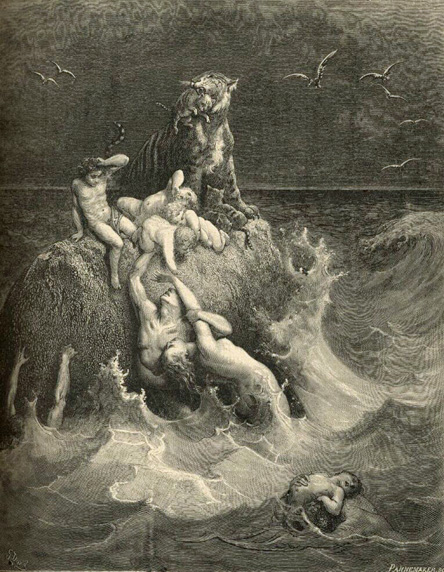
In the selfsame day entered Noah, and Shem, and Ham, and Japheth, the sons of Noah, and Noah's wife, and the three wives of his sons with them, into the ark; they, and every beast after his kind, and all the cattle after their kind, and every creeping thing that creepeth upon the earth after his kind, and every fowl after his kind, every bird of every sort. And they went in unto Noah into the ark, two and two of all flesh, wherein is the breath of life. And they that went in, went in male and female of all flesh, as God had commanded him: and the Lord shut him in.
And the flood was forty days upon the earth; and the waters increased, and bare up the ark, and it was lift up above the earth. And the waters prevailed, and were increased, greatly upon the earth; and the ark went upon the face of the waters. And the waters prevailed exceedingly upon the earth; and all the high hills that were under the whole heaven were covered. Fifteen cubits upward did the waters prevail; and the mountains were covered. And all flesh died that moved upon the earth, both off owl, and of cattle, and of beast, and of every creeping thing that creepeth upon the earth, and every man; all in whose nostrils was the breath of life, of all that was in the dry land, died. And every living substance was destroyed which was upon the face of the ground, both man and cattle, and the creeping things, and the fowl of the heaven; and they were destroyed from the earth; and Noah only remained alive, and they that were with him in the ark.
And the waters prevailed upon the earth an hundred and fifty days.
Genesis vii, 11-24
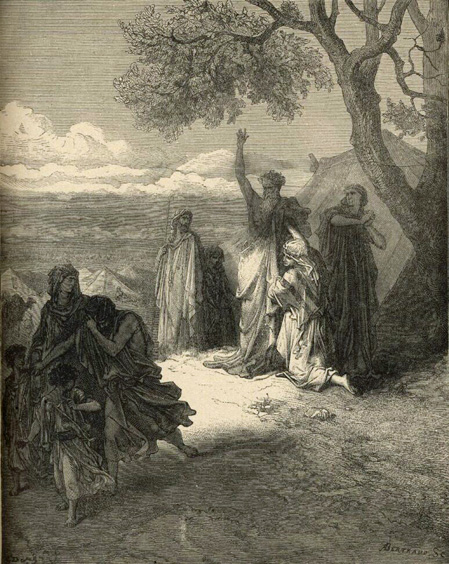
And Noah began to be an husbandman, and he planted a vineyard: And he drank of the wine, and was drunken; and he was uncovered within his tent. And Ham, the father of Canaan, saw the nakedness of his father, and told his two brethren without. And Shem and Japheth took a garment, and laid it upon both their shoulders, and went backward, and covered the nakedness of their father; and their faces were backward, and they saw not their father's nakedness. And Noah awoke from his wine, and knew what his younger son had done unto him. And he said, Cursed be Canaan; a servant of servants shall he be unto his brethren. And he said, Blessed be the Lord God of Shem; and Canaan shall be his servant. God shall enlarge Japheth, and he shall dwell in the tents of Shem; and Canaan shall be his servant.
Genesis ix, 18-27
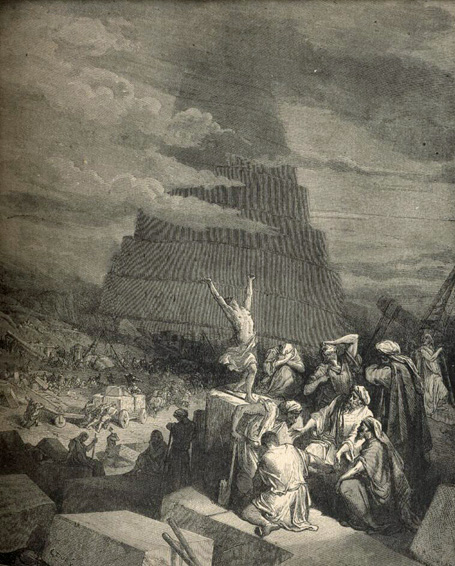
And it came to pass as they journeyed from the east, that they found a plain in the land of Shinar; and they dwelt there. And they said one to another, Go to, let us make brick, and burn them thoroughly. And they had brick for stone, and slime had they for mortar. And they said, Go to, let us build us a city and a tower, whose top may reach unto heaven; and let us make us a name, lest we be scattered abroad upon the face of the whole earth.
And the Lord came down to see the city and the tower which the children of men built. And the Lord said, Behold, the people is one, and they have all one language; and this they begin to do: and now nothing will be restrained from them, which they have imagined to do. Go to, let us go down, and there confound their language, that they may not understand one another's speech.
So the Lord scattered them abroad from thence upon the face of all the earth: and they left off to build the city.
Therefore is the name of it called Babel; because the Lord did there confound the language of all the earth: and from thence did the Lord scatter them abroad upon the face of all the earth.
Genesis xi, 1-9
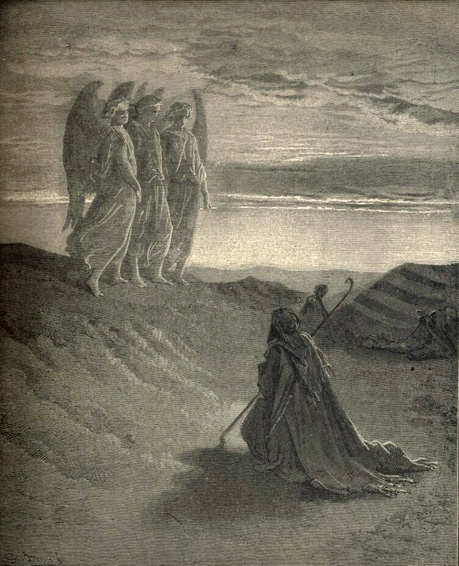
And the Lord appeared unto him in the plains of Mamre: and he sat in the tent door in the heat of the day; and he lift up his eyes and looked, and, lo, three men stood by him: and when he saw them, he ran to meet them from the tent door, and bowed himself toward the ground, and said, My Lord, if now I have found favoring thy sight, pass not away, I pray thee, from thy servant: let a little water, I pray you, be fetched, and wash your feet, and rest yourselves under the tree: And I will fetch a morsel of bread, and comfort ye your hearts; after that ye shall pass on: for therefore are ye come to your servant. And they said, So do, as thou hast said.
And Abraham hastened into the tent unto Sarah, and said, Make ready quickly three measures of fine meal, knead it, and make cakes upon the hearth. And Abraham ran unto the herd, and fetched a calf tender and good, and gave it unto a young man; and he hastened to dress it. And he took butter, and milk, and the calf which he had dressed, and set it before them; and he stood by them under the tree, and they did eat.
Genesis xvii, 26, 27; xviii 1-8
Be not forgetful to entertain strangers: for thereby some have entertained angels unawares.
Hebrews xiii, 2
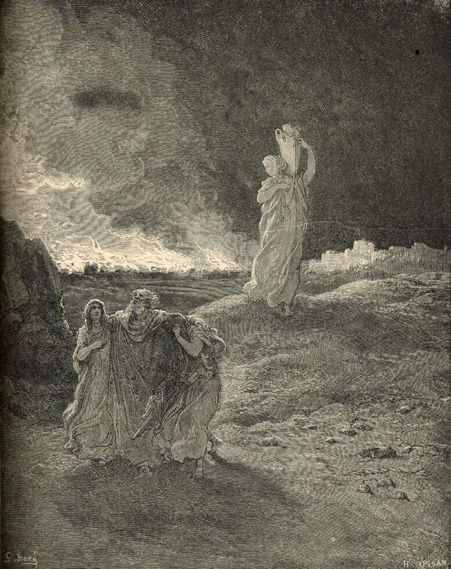
And it came to pass, when they had brought them forth abroad, that he said, Escape for thy life; look not behind thee, neither stay thou in all the plain; escape to the mountain, lest thou be consumed. And Lot said unto them, Oh, not so, my Lord. Behold now, thy servant hath found grace in thy sight, and thou hast magnified thy mercy, which thou hast showed unto me in saving my life; and I cannot escape to the mountain, lest some evil take me and I die. Behold now this city is near to flee unto, and it is a little one: Oh, let me escape thither (is it not a little one?) and my soul shall live. And he said unto him, See, I have accepted thee concerning this thing also, that I will not overthrow this city, for which thou hast spoken. Haste thee; escape thither; for I cannot do anything till thou become thither.
Therefore the name of the city was called Zoar.
The sun was risen upon the earth when Lot entered unto Zoar. Then the Lord rained upon Sodom and upon Gomorrah brimstone and fire from the Lord out of heaven; and he overthrew those cities, and all the plain, and all the inhabitants of the cities, and that which grew upon the ground.
But his wife looked back from behind him, and she became a pillar of salt.
And Abraham got up early in the morning to the place where he stood before the Lord and he looked toward Sodom and Gomorrah, and toward all the land of the plain, and beheld, and lo, the smoke of the country went up as the smoke of a furnace.
Genesis xix, 15-28
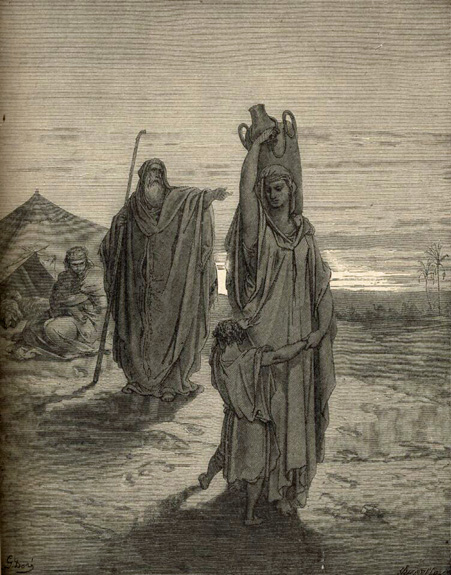
And Sarah said, God hath made me to laugh, so that all that hear will laugh with me. And she said, who would have said unto Abraham, that Sarah should have given children suck? For I have born him a son in his old age. And the child grew, and was weaned: and Abraham made a great feast the same day that Isaac was weaned.
And Sarah, saw the son of Hagar, the Egyptian, which she had born unto Abraham, mocking. Wherefore she said unto Abraham, Cast out this bondwoman and her son; for the son of this, bondwoman shall not be heir with my son, even with Isaac.
And the thing was very grievous in Abraham's sight because of his son. And God said unto Abraham, Let it not be grievous in thy sight because of the lad, and because of thy bondwoman; in all that Sarah hath said unto thee, hearken unto her voice; for in Isaac shall thy seed be called. And also of the son of the bondwoman will I make a nation, because he is thy seed.
And Abraham rose up early in the morning, and took bread, and a bottle of water, and gave it unto Hagar, putting it on her shoulder, and the child, and sent her away: and she departed, and wandered in the wilderness of Beer-Sheba.
Genesis xxi, 1-14
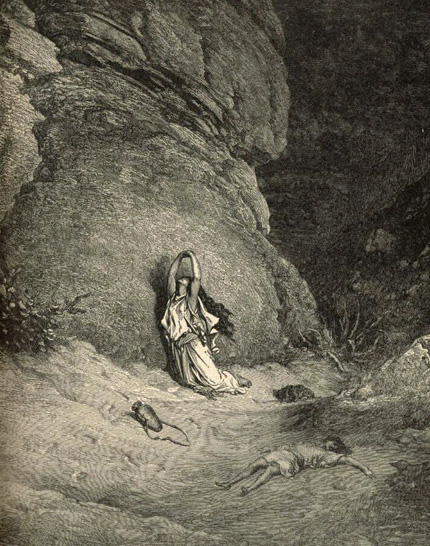
Genesis xxi. 14-21
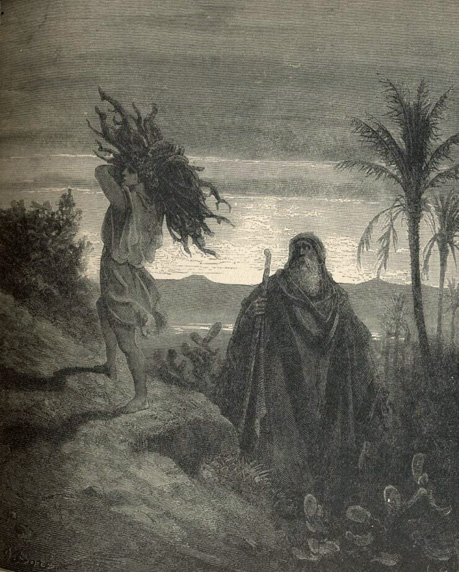
And Abraham rose up early in the morning, and saddled his ass, and took two of his young men with him, and Isaac his son, and clave the wood for the burnt offering, and rose up and went unto the place of which God had told him. Then on the third day Abraham lifted up his eyes and saw the place afar off. And Abraham said unto his young men, Abide ye here with the ass; and I and the lad will go yonder and worship, and come again to you. And Abraham took the wood of the burnt offering and laid it upon Isaac his son; and he took the fire in his hand and a knife, and they went both of them together. And Isaac spoke unto Abraham his father, and said, My father: and he, said, Here am I, my son. And he said, Behold the fire and the wood: but where is the lamb for a burnt offering? And Abraham said, My son, God will provide himself a lamb for a burnt offering: so they went both of them together. And they came to the place which God had told him of; and Abraham built an altar there, and laid the wood in order, and bound Isaac his son, and laid him on the altar upon the wood. And Abraham stretched forth his hand and took the knife to slay his son. And the angel of the Lord called unto him out of heaven, and said, Abraham, Abraham: and he said, Here am I. And he said, Lay not thine hand upon the lad, neither do thou anything unto him: for now I know that thou fearest God, seeing thou hast not withheld thy son, thine only son, from me. And Abraham lifted up his eyes and looked, and behold behind him a ram caught in a thicket by his horns: and Abraham went and took the ram, and offered him up for a burnt offering in the stead of his son.
And Abraham called the name of that place Jehovah-jireh: as it is to this day, In the mount of the Lord it shall be seen.
And the angel of the Lord called unto Abraham out of heaven the second time, and said, By myself have I sworn, saith the Lord, for because thou hast done this thing, and hast not withheld thy son, thine only son, that in blessing I will bless thee, and in multiplying I will multiply thy seed as the stars of heaven, and as the sand which is upon the sea shore; and thy seed shall possess the gate of his enemies; and in thy seed shall allthe nations of the earth be blessed, because thou hast obeyed my voice.
Genesis xxii. 1-18
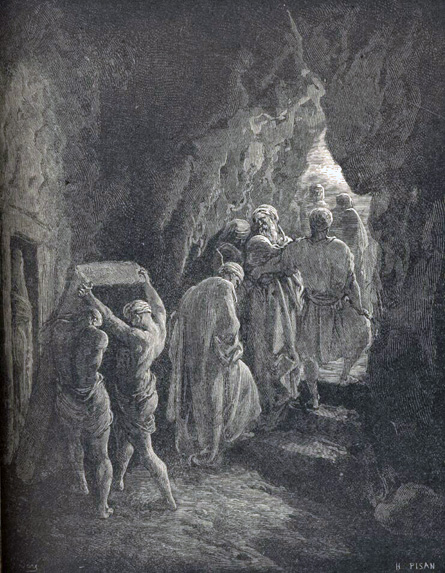
And Abraham stood up from before his dead, and spoke unto the sons of Heth, saying, I am a stranger and a sojourner with you: give me a possession of a burying-place with you, that I may bury my dead out of my sight.
And the children of Heth answered Abraham, saying unto him, Hear us, my lord: thou art a mighty prince among us: in the choice of our sepulchers bury thy dead; none of us shall withhold from thee his sepulcher, but that thou may bury thy dead.
And Abraham stood up, and bowed himself to the people of the land, even to the children of Heth. And he communed with them, saying, If it be your mind that I should bury my dead out of my sight; hear me, and entreat for me to Ephron the son of Zohar, that he may give me the cave of Machpelah, which he hath, which is in the end of his field; for as much money as it is worth he shall give it me for a possession of a burying-place amongst you.
And Ephron dwelt among the children of Heth: and Ephron the Hittite answered Abraham in the audience of the children of Heth, even of all that went in at the gate of his city, saying, Nay, my lord, hear me: the field give I thee, and the cave that is therein, I give it thee; in the presence of the sons of my people give I it thee: bury thy dead.
And Abraham bowed down himself before the people of the land. And he spoke unto Ephron in the audience of the people of theland, saying, But if thou wilt give it, I pray thee, hear me: I will give thee money for the field; take it of me, and I will bury my dead there.
And Ephron answered Abraham, saying unto him, My lord, hearken unto me: the land is worth four hundred shekels of silver: what is that betwixt me and thee? Bury therefore thy dead.
And Abraham hearkened unto Ephron; and Abraham weighed to Ephron the silver, which he had named in the audience of the sons of Heth, four hundred shekels of silver, current money with the merchant.
And the field of Ephron, which was in Machpelah, which was before Mamre, the field, and the cave which was therein, and all the trees that were in the field, that were in all the borders round about, were made sure unto Abraham for a possession in the presence of the children of Heth, before all that went in at the gate of his city.
And after this, Abraham buried Sarah his wife in the cave of the field of Machpelah before Mamre; the same is Hebron in the land of Canaan. And the field, and the cave that is therein, were made sure unto Abraham for a possession of a burying-place by the sons of Heth.
Genesis xxiii
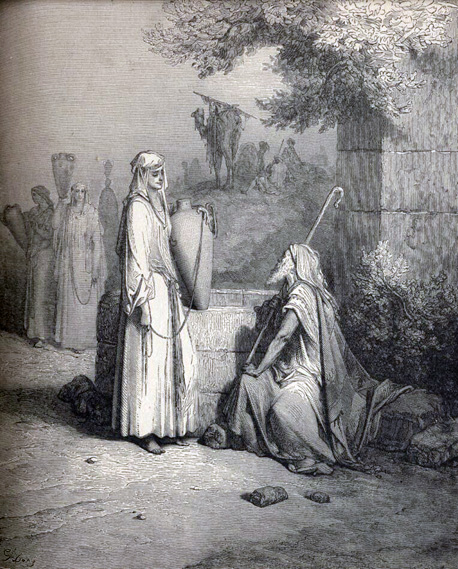
And the servant took ten camels of the camels of his master, and departed; for all the goods of his master were in his hand: and he arose and went to Mesopotamia, unto the city of Nahor. And he made his camels to kneel down, without the city by a well of water at the time of the evening, even the time that women go out to draw water. And he said, O Lord God of my master Abraham, I pray thee, send me good speed this day, and show kindness unto my master Abraham. Behold, I stand here by the well of water; and the daughters of the men of the city come out to draw: water: and let it come to pass, that the damsel to whom I shall say, Letdown thy pitcher, I pray thee, that I may drink; and she shall say, Drink, and I will give thy camels drink also: let the same be said that thou hast appointed for thy servant Isaac; and thereby shall I know that thou hast showed kindness unto my master.
And it came to pass before he had done speaking, that, behold, Rebekah came out, who was born to Bethuel, son of Milcah, the wife of Nahor, Abraham's brother, with her pitcher upon her shoulder. And the damsel was very fair to look upon, a virgin, neither had any man known her: and she went down to the well, and filled her pitcher and came up. And the servant ran to meet her, and said, let me, I pray thee, drink a little water of thy pitcher. And she said, Drink, my lord; and she hasted, and letdown her pitcher upon her hand, and gave him drink. And when she had done giving him drink, she said, I will draw water for thycamels also, until they have done drinking. And she hasted and emptied her pitcher into the trough, and ran again unto the well to draw water, and drew for all his camels.
And the man wondering at her held his peace, to wit whether the Lord had made his journey prosperous or not.
And it came to pass, as the camels had done drinking, that the man took a golden earring of half a shekel weight, and two bracelets for her hands of ten shekels weight of gold: and said, Whose daughter art thou? Tell me, I pray thee; is there room in thy father's house for us to lodge in? And she said unto him, I am the daughter of Bethuel the son of Milcah, which she bare unto Nahor. She said moreover unto him, We have both straw and provender enough, and room to lodge in.
And the man bowed down his head and worshiped the Lord. And he said, Blessed be the Lord God of my master Abraham, who hath not left destitute my master of his mercy and his truth: I being in the way, the Lord led me to the house of my master's brethren.
And the damsel ran, and told them of her mother's house these things.
Genesis xxiv, 9-28
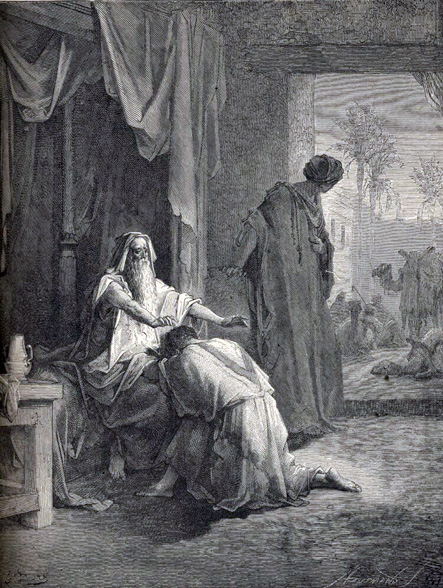
And Rebekah heard when Isaac spoke to Esau his son. And Esau went to the field to hunt for venison, and to bring it.
And Rebekah spoke unto Jacob her son, saying, Behold, I heard thy father speak unto Esau thy brother, saying, Bring me venison, and make me savory meat, that I may eat, and bless thee before the Lord before my death. Now therefore, my son, obey my voice according to that which I command thee. Go now to the flock, and fetch me from thence two good kids of the goats; and I will make them savory meat for thy father such as he loves; And thou shalt bring it to thy father, that he may eat, and that he may bless thee before his death.
And Jacob said to Rebekah his mother, Behold, Esau my brother is a hairy man, and I am a smooth man: My father peradventure will feel me, and I shall seem to him as a deceiver; and I shall bring a curse upon me, and not a blessing.
And his mother said unto him, Upon me be thy curse, my son: only obey my voice, and go fetch me them.
And he went, and fetched, and brought them to his mother: and his mother made savory meat, such as his father loved. And Rebekah took goodly raiment of her eldest son Esau, which were with her in the house, and put them upon Jacob her younger son: And she put the skins of the kids of the goats upon his hands and upon the smooth of his neck: And she gave the savory meat and the bread, which she had prepared, into the hand of her son Jacob.
And he came unto his father, and said, my father: and he said, Here am I; who art thou, my son? And Jacob said unto his father, I am Esau thy first born; I have done according as thou bade me: arise, I pray thee, sit and eat of my venison, that thy soul may bless me. And Isaac said unto his son, how is it that thou hast found it so quickly, my son? And he said, because the Lord thy God brought it to me. And Isaac said unto Jacob, Come near, I pray thee, that I may feel thee, my son, whether thou be my very son Esau or not. And Jacob went; near unto Isaac his father; and he felt him, and said, the voice is Jacob's voice, but the hands are the hands of Esau. And he discerned him not, because his hands were hairy, as his brother Esau's hands: so he blessed him.
And he said, Art thou my very son Esau? And he said I am. And he said, Bring it near to me, and I will eat of my son's venison, that my soul may bless thee. And he brought it near to him, and he did eat; and he brought him wine, and he drank. And his father Isaac said unto him, Come near now, and kiss me, my son. And he came near, and kissed him: and he smelled the smell of his raiment, and blessed him, and said, See, the smell of my son is as the smell of a field which the Lord hath blessed: Therefore God give thee of the dew of heaven, and the fatness of the earth, and plenty of corn and wine: Let people serve thee, and nations bow down to thee: be lord over thy brethren, and let thy mother's sons bow down to thee: cursed be every one that curseth thee, and blessed be he that blesseth thee.
Genesis xxvii. 1-29
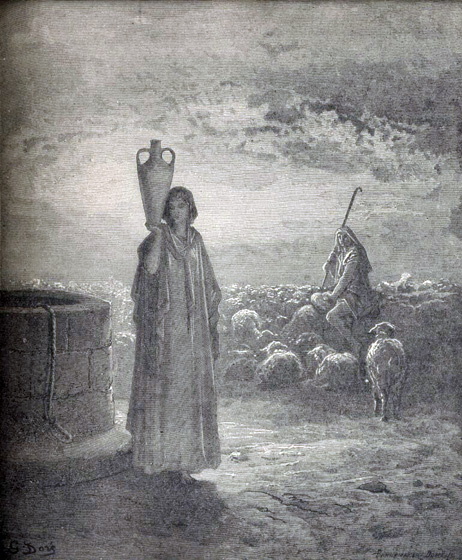
And it came to pass, when Laban heard the tidings of Jacob his sister's son, that he ran to meet him, and embraced him, and kissed him, and brought him to his house. And he told Laban all these things. And Laban said to him, surely thou art my bone and my flesh. And he abode with him the space of a month. And Laban said unto Jacob, because thou art my brother, shouldest thou therefore serve me for naught? tell me, what shall thy wages be?
And Laban had two daughters: the name of the elder was Leah, and the name of the younger was Rachel. Leah was tender eyed; but Rachel was beautiful and well favored.
And Jacob loved Rachel; and said, I will serve thee seven years for Rachel thy younger daughter. And Laban said, it is better that I give her to thee, than that I should give her to another man; abide with me.
And Jacob served seven years for Rachel; and they seemed unto him but a few days, for the love he had for her. And Jacob said unto Laban, Give me my wife, for my days are fulfilled, that I may go in unto her.
And Laban gathered together all the men of the place, and made a feast. And it came to pass in the evening that he took Leah his daughter, and brought her to him; and he went in unto her. And Laban gave unto his daughter Leah Zilpah his maid, for a handmaid. And it came to pass that in the morning, behold, it was Leah: and he said to Laban, What is this thou hast done unto me? Did not I serve with thee for Rachel? Wherefore then hast thou beguiled me? And Laban said, It must not be so done in our country, to give the younger before the firstborn. Fulfill her week, and we will give thee this also for the service which thou halt serve with me yet seven other years.
And Jacob did so, and fulfilled her week; and he gave him Rachel his daughter to wife also. And Laban gave to Rachel his daughter Bilhah his handmaid to be her maid. And he went in also unto Rachel, and he loved also Rachel more than Leah, and served with him yet seven other years.
Genesis xxix, 9-30
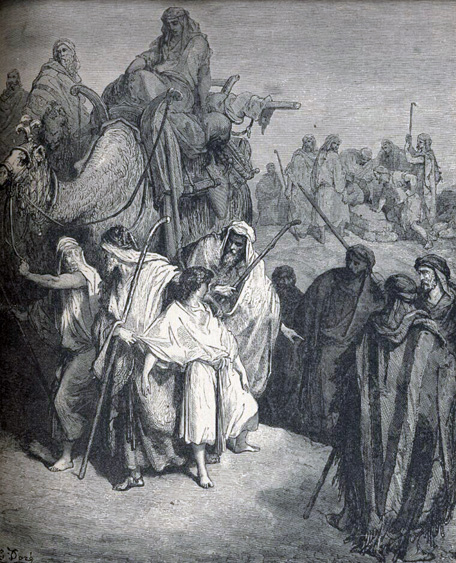
And Joseph dreamed a dream, and he told it his brethren: and they hated him yet the more. And he said unto them, Hear, I pray you, this dream which I have dreamed. For, behold, we were binding sheaves in the field, and, lo, my sheaf arose, and also stood upright; and, beholds, your sheaves stood round about, and made obeisance to my sheaf. And his brethren said to him, Shalt thou indeed reign over us? Or shalt thou indeed have dominion over us? And they hated him yet the more for his dreams and for his words.
And he dreamed yet another dream, and told it his brethren, and said, Behold, I have dreamed a dream more; and, behold, the sun and the moon and the eleven stars made obeisance to me. And he told it to his father and to his brethren; and his father rebuked him, and said unto him, what is this dream that thou has dreamed? Shall I and thy mother and thy brethren indeed come to bow down ourselves to thee to the earth? And his brethren envied him; but his father observed the saying.
And his brethren went to feed their father's flock in Shechem.
And Joseph went after his brethren, and found them in Dothan. And when they saw him afar off, even before he came near unto them, they conspired against him to slay him. And they said one to another, Behold, this dreamer cometh. Come now, therefore, and let us slay him, and cast him into some pit, and we will say, some evil beast hath devoured him; and we shall see what will become of his dreams. And Reuben heard it, and he delivered him out of their hands; and said, Let us not kill him. And Reuben said unto them, Shed no blood, but cast him into this pit that is in the wilderness, and lay no hand upon him; that he might rid him out of their hands to deliver him to his father again.
And it came to pass, when Joseph was come unto his brethren, that they stripped Joseph out of his coat, his coat of many colors that was on him; and they took him and cast him into a pit; and the pit was empty, there was no water in it. And they sat down to eat bread; and they lifted up their eyes and looked, and, behold, a company of Ishmaelite came from Gilead with their camels bearing spicery and balm and myrrh, going to carry it down to Egypt. And Judah said unto his brethren, what profit is it if we slay our brother, and conceal his blood? Come, and let us sell him to the Ishmaelites, and let not our hand be upon him, for he is our brother and our flesh. And his brethren were content.
Then there passed by Midianites merchantmen; and they drew and lifted up Joseph out of the pit, and sold Joseph to the Ishmaelites for twenty pieces of silver; and they brought Joseph into Egypt.
And the Midianites sold him into Egypt unto Potiphar, an officer of Pharaoh's, and captain of the guard.
Genesis xxxvii, 2-12, 17-28, 36
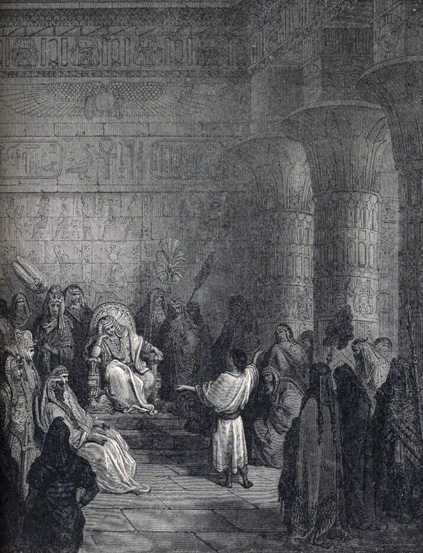
And he slept and dreamed the second time: and, behold, seven ears of corn came up upon one stalk, rank and good. And, behold seven thin ears and blasted with the east wind sprung up after them. And the seven thin ears devoured the seven rank and full ears. And Pharaoh awoke, and, behold, it was a dream.
And it came to pass in the morning that his spirit was troubled; and he sent and called for all the magicians of Egypt, and all the wise men thereof: and Pharaoh told them his dream; but there was none that could interpret them unto Pharaoh.
At the suggestion of his chief butler Pharaoh sends for Joseph and relates to him his dreams, which Joseph interprets as follows:
And Joseph said unto Pharaoh, The dream of Pharaoh is one: God hath showed Pharaoh what he is about to do. The seven good kine are seven years; and the seven good ears are seven years: the dream is one. And the seven thin and ill favored kine that came up after them are seven years; and the seven empty ears blasted with the east wind shall be seven years of famine. This is the thing which I have spoken unto Pharaoh: What God is about to do he showed unto Pharaoh. Behold, there come seven years of great plenty throughout all the land of Egypt: And there shall arise after them seven years of famine; and all the plenty shall be forgotten in the land of Egypt; and the famine shall consume the land; and the plenty shall not be known in the land by reason of that famine following; for it shall be very grievous. And for that the dream was doubled unto Pharaoh twice it is because the thing is established by God, and God will shortly bring it to pass.
Now therefore let Pharaoh look out a man discreet and wise, and set him over the land of Egypt. Let Pharaoh do this, and let him appoint officers over the land, and take up the fifth part of the land of Egypt in the seven plenteous years. And let them gather all the food of those good years that come, and lay up corn under the hand of Pharaoh, and let them keep food in the cities. And that food shall be stored to the land against the seven years of famine, which shall be in the land of Egypt; that the land perish not through the famine.
Genesis xli, 1-36
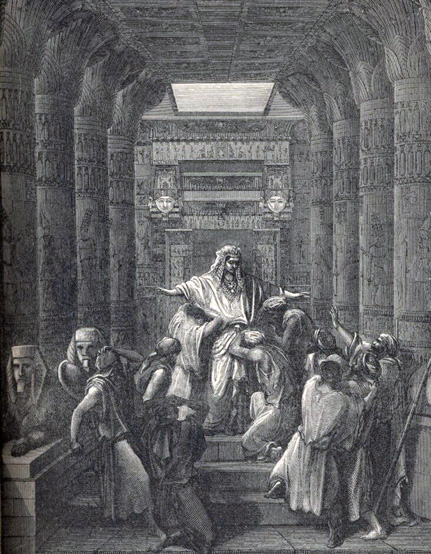
And Joseph said unto his brethren, I am Joseph; doth my father yet live? And his brethren could not answer him; for they were troubled at his presence. And Joseph said unto his brethren, Come near to me, I pray you. And they came near. And he said, I am Joseph your brother, whom ye sold into Egypt. Now therefore be not grieved, nor angry with yourselves, that ye sold me hither: for God did send me before you to preserve life. For these two years hath the famine been in the land: and yet there are five years, in which there shall neither be earning nor harvest. And God sent me before you to preserve you posterity in the earth, and to save your lives by a great deliverance. So now it was not you that sent me hither, but God: and he hath made me a father to Pharaoh, and lord of his entire house, and a ruler throughout all the land of Egypt. Haste ye, and go up to my father, and say unto him, Thus saith thy son Joseph, God hath made me lord of all Egypt: come down unto me, tarry not: And thou shalt dwell in the land of Goshen, and thou shalt be near unto me, thou, and thy children, and thy children's children, and thy flocks, and thy herds, and all that thou hast. And there will I nourish thee; for yet there are five years of famine; lest thou, and thy household, and all that thou hast, come to poverty. And, behold, your eyes see, and the eyes of my brother Benjamin, that it is my mouth that speaketh unto you. And ye shall tell my father of all my glory in Egypt, and of all that ye have seen; and ye shall haste and bring down my father hither.
And he fell upon his Brother Benjamin's neck, and wept; and Benjamin wept upon his neck. Moreover he kissed all his brethren, and wept upon them: and after that his brethren talked with him.
And the fame thereof was heard in Pharaoh's house, saying, Joseph's brethren are come and it pleased Pharaoh well, and his servants.
And Pharaoh said unto Joseph, say unto thy brethren, This doye; lade your beasts, and go, get you unto the land of Canaan; and take your father and your households, and come unto me: and I will give you the good of the land of Egypt, and ye shall eat the fat of the land.
Genesis xlv, 1-18
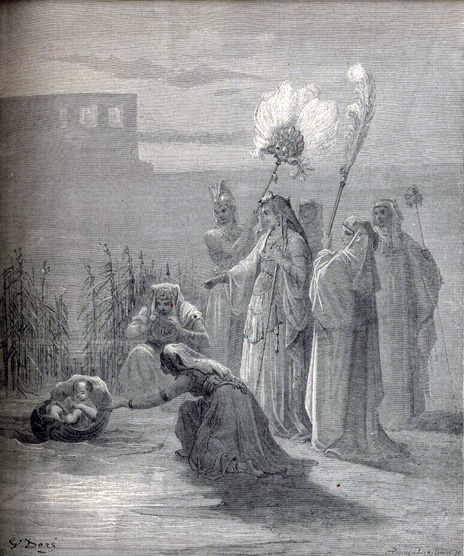
And the daughter of Pharaoh came down to wash herself at the river; and her maidens walked along by the river's side; and when she saw the ark among the flags, she sent her maid to fetch it. And when she had opened it, she saw the child: and, behold, the babe wept. And she had compassion on him, and said, this is one of the Hebrews' children. Then said his sister to Pharaoh's daughter, Shall I go and call to thee a nurse of the Hebrew women, that she may nurse the child for thee? And Pharaoh's daughter said to her, Go. And the maid went and called the child's mother. And Pharaoh's daughter said unto her, Take this child away, and nurse it for me, and I will give thee thy wages. And the woman took the child and nursed it.
And the child grew, and she brought him unto Pharaoh's daughter, and he became her son. And she called his name Moses: and she said, Because I drew him out of the water.
Exodus ii,1-10
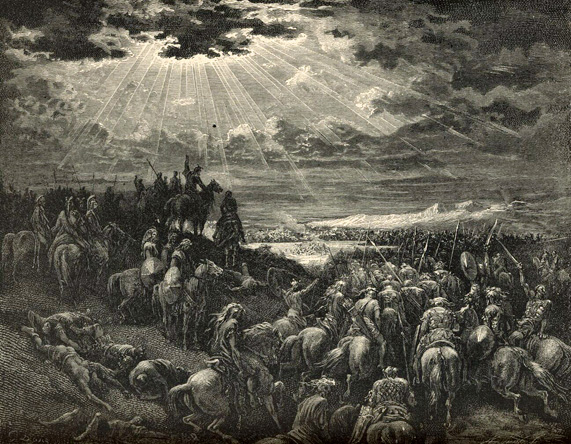
And the men of Gibeon sent unto Joshua to the camp to Gilgal, saying, Slack not thy hand from thy servants; come up to usquickly, and save us and help us: for all the kings of theAmorites that dwell in the mountains are gathered together against us.
So Joshua ascended from Gilgal, he, and all the people of war with him, and all the mighty men of valor. And the Lord said unto Joshua, Fear them not: for I have delivered them into thine hand; there shall not a man of them stand before thee. Joshua therefore came unto them suddenly, and went up from Gilgal all night. And the Lord discomfited them before Israel, and slew them with a great slaughter at Gibeon, and chased them along the way that goeth up to Beth-horon, and smote them to Azekah, and unto Makkedah. And it came to pass, as they fled from before Israel, and were in the going down to Beth-horon, that the Lord cast down great stones from heaven upon them unto Azekah, and they died: they were more which died with hailstones than they whom the children of Israel slew with the sword.
Then spoke Joshua to the Lord in the day when the Lord delivered up the Amorites before the children of Israel, and he said in the sight of Israel, Sun, stand thou still upon Gibeon; and thou, Moon, in the valley of Ajalon. And the sun stood still, and the moon stayed, until the people had avenged themselves upon their enemies. Is not this written in the book of Jasher? So the sun stood still in the midst of heaven, and hastened not to go down about a whole day. And there was no day like that before it or after it, that the Lord hearkened unto the voice of a man: for the Lord fought for Israel.
And Joshua returned, and all Israel with him, unto the camp to Gilgal. But these five kings fled, and hid themselves in a caveat Makkedah. And it was told Joshua, saying, The five kings are found hid in a cave at Makkedah. And Joshua said, Roll great stones upon the mouth of the cave, and set men by it for to keep them: and stay ye not, but pursue after your enemies, and smite the hindmost of them; suffer them not to enter into their cities; for the Lord your God hath delivered them into your hand.
And it came to pass, when Joshua and the children of Israelhad made an end of slaying them with a very great slaughter, till they were consumed, that the rest which remained of them entered into fenced cities.
Joshua x, 5-20
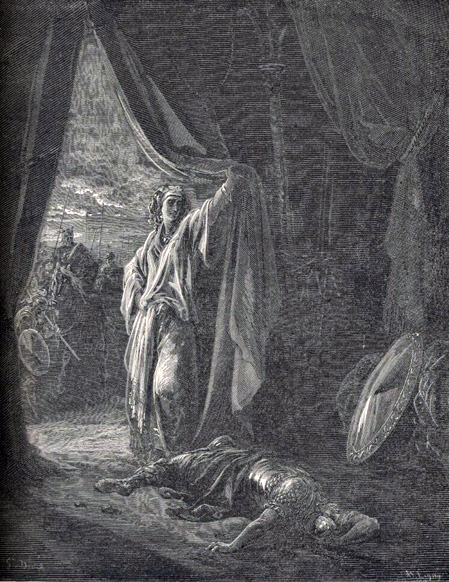
And they showed Sisera that Barak, the son of Abinoam, was gone up to Mount Tabor. And Sisera gathered together all his chariots, even nine hundred chariots of iron, and all the people that were with him, from Harosheth of the Gentiles unto the river of Kishon. And Deborah said unto Barak, Up; for this is the day in which the Lord hath delivered Sisera into thine hand: is not the Lordgone out before thee? So Barak went down from Mount Tabor, and ten thousand men after him.
And the Lord discomfited Sisera, and all his chariots and all his host, with the edge of the sword before Barak; so that Sisera lighted down off his chariot, and fled away on his feet. But Barak pursued after the chariots, and after the host, unto Harosheth of the Gentiles: and all the host of Sisera fell upon the edge of the sword; and there was not a man left.
Howbeit Sisera fled away on his feet to the tent of Jael, the wife of Heber the Kenite; for there was peace between Jabin the king of Hazor and the house of Heber the Kenite. And Jael went out to meet Sisera, and said unto him, Turn in, my lord, turn into me; fear not. And when he had turned in unto her into the tent, she covered him with a mantle. And he said unto her, Giveme, I pray thee, a little water to drink; for I am thirsty. And she opened a bottle of milk, and gave him drink, and covered him. Again he said unto her, Stand in the door of the tent, and it shall be, when any man doth come and enquire of thee, and say, Isthere any man here? That thou shalt say, no. Then Jael, Heber's wife, took a nail of the tent, and took a hammer in her hand, and went softly unto him, and smote the nail into his temples, and fastened it into the ground: for he was fast asleep and weary. So he died.
And, behold, as Barak pursued Sisera, Jael came out to meet him, and said unto him, Come, and I will show thee the man whom thou seekest. And when he came into her tent, behold, Sisera lay dead, and the nail was in his temples.
Judges iv, 2-22
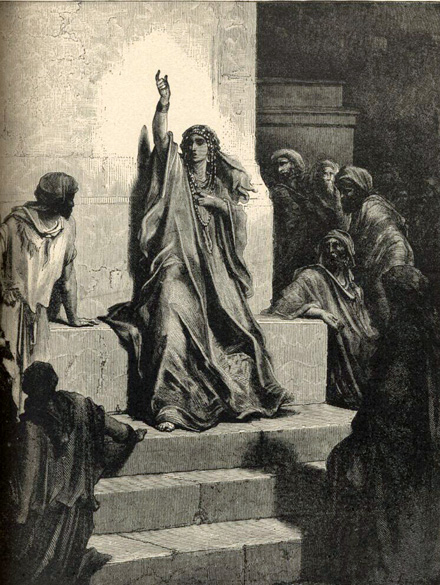
Praise ye the Lord for the avenging of Israel, When the people willingly offered themselves. Hear, O ye kings; give ear, O ye princes; I, even I, will sing unto the Lord; I will sing praise to the Lord God of Israel. Lord, when thou went out of Seir, when thou march out of the field of Edom, The earth trembled, and the heavens dropped, the clouds also dropped water. Themountains melted from before the Lord, Even that Sinai from before the Lord God of Israel.
Blessed above women shall Jael the wife of Heber the Kenitebe; Blessed shall she be above women in the tent. He asked water, and she gave him milk; she brought forth butter in a lordly dish. She put her hand to the nail, and her right hand to the workmen's hammer; And with the hammer she smote Sisera, She smote off his head, when she had pierced and stricken through his temples. At her feet he bowed, he fell, he lay down: At her feet he bowed, he fell: Where he bowed, there he fell down dead. The mother of Sisera looked out at a window, and cried through the lattice, why is his chariot so long in coming? Why tarry the wheels of his chariots? Her wise ladies answered her, yea; she returned answer to herself, Have they not sped? Have they not divided the prey; To every man a damsel or two; To Sisera a prey of divers colors, a prey of divers colors of needlework, Of divers colors of needlework on both sides, meet for the necks of them that take the spoil? So let all thine enemies perish, O Lord: But let them that love him be as the sun when he goes forth in his might.
Judges v, 2-5, 24-31
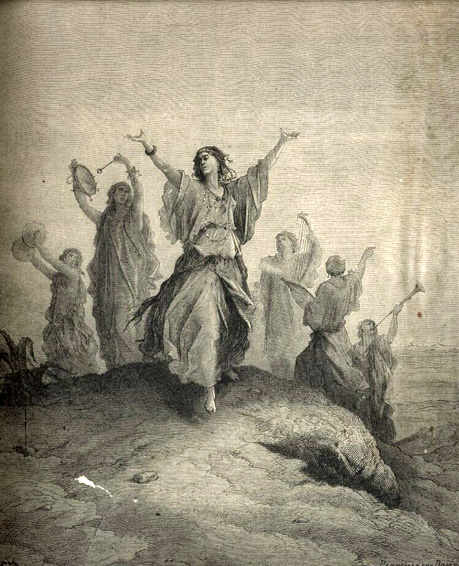
And Jephthah vowed a vow unto the Lord, and said, If thou shalt without fail deliver the children of Ammon into mine hands, then it shall be, that whatsoever cometh forth of the doors of my house to meet me, when I return in peace from the children of Ammon, shall surely be the Lord's, and I will offer it up for a burnt offering.
So Jephthah passed over unto the children of Ammon to fight against them; and the Lord delivered them into his hands. And he smote them from Aroer, even till thou come to Minnith, even twenty cities, and unto the plain of the vineyards, with a very great slaughter. Thus the children of Ammon were subdued before the children of Israel.
And Jephthah came to Mizpeh unto his house, and, behold, his daughter came out to meet him with timbrels and with dances: and she was his only child; beside her he had neither son nor daughter.
Judges xi, 29-34
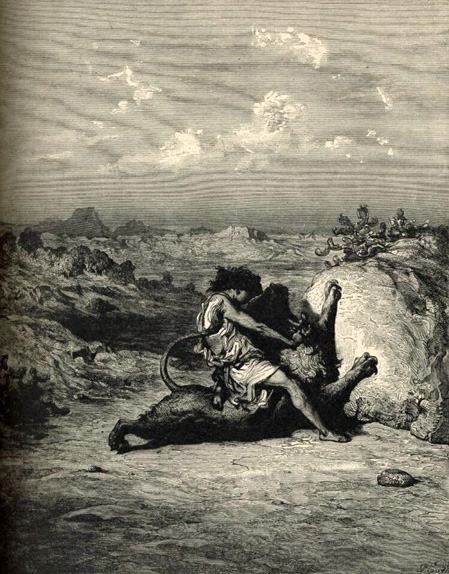
Judges xiv, 5-6
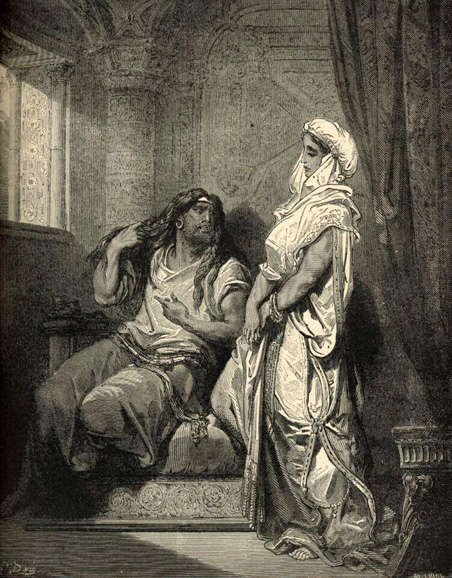
And the lords of the Philistines came up unto her, and said unto her, Entice him, and see wherein his great strength lieth, and by what means we may prevail against him, that we may bind him to afflict him; and we will give thee every one of us eleven hundred pieces of silver.
And Delilah said to Samson, Tell me, I pray thee, wherein thy great strength lieth, and wherewith thou mightest be bound to afflict thee. And Samson said unto her, If they bind me with seven green withs that were never dried, then shall I be weak, and be as another man. Then the lords of the Philistines brought up to her seven green withs which had not been dried and she bound him with them. Now there were men lying in wait, abiding with her in the chamber. And she said unto him, The Philistines be upon thee, Samson. And he brake the withs, as a thread of tow is broken when it touched the fire. So his strength was not known.
And Delilah said unto Samson, Behold, thou hast mocked me, and told me lies: now tell me, I pray thee, wherewith thou mightiest be bound. And he said unto her, If they bind me fast with clew ropes that never were occupied, then shall I be weak, and be as another man. Delilah therefore took new ropes, and bound him therewith, and said unto him, The Philistines be upon thee, Samson. And there were liers in wait abiding in the chamber. And he brake them from off his arms like a thread.
And Delilah said unto Samson, Hitherto thou hast mocked me, and told me lies: tell me wherewith thou mightest be bound. And he said unto her, If thou weaves the seven locks of my head with the web. And she fastened it with the pin, and said unto him, The Philistines be upon thee, Samson. And he awaked out of his sleep, and went away with the pin of the beam and with the web.
And she said unto him, How canst thou say, I love thee; when thine heart is not with me? Thou hast mocked me these three times, and hast not told me wherein thy great strength lieth. And it came to pass, when she pressed him daily with her words, and urged him, so that his soul was vexed unto death; that he told her all his heart, and said unto her, There hath not come a razor upon mine head; for I have been a Nazarite unto God from my mother's womb if I be shaven, then my strength will go from me, and I shall become weak, and be like any other man.
And when Delilah saw that he had told her all his heart, she sent and called for the lords of the Philistines, saying, Come up this once, for he hath showed me all his heart. Then the lords of the Philistines came up unto her, and brought money in their hand. And she made him sleep upon her knees; and she called for a man, and she caused him to shave off the seven locks of his head; and she began to afflict him, and his strength went from him. And she said, The Philistines be upon thee, Samson. And he awoke out of his sleep, and said, I will go out as at other times before, and shake myself. And he wished not that the Lord was departed from him.
Judges xvi, 4-20
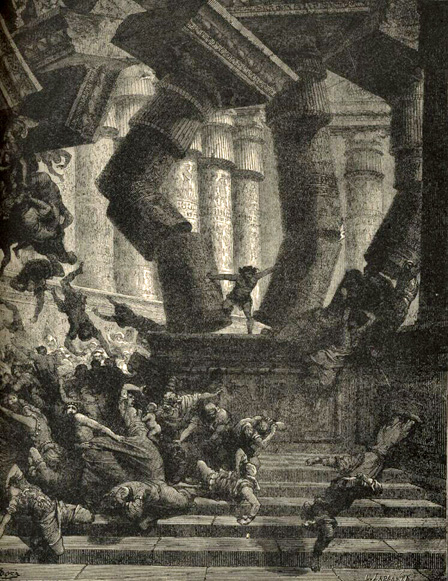
Howbeit the hair of his head began to grow again after he was shaven.
Then the lords of the Philistines gathered them together for to offer a great sacrifice unto Dagon their god, and to rejoice: for they said, Our God hath delivered Samson our enemy into our hand. And when the people saw him, they praised their god: for they said, our god hath delivered into our hands our enemy, and the destroyer of our country, which slew many of us. And it came to pass, when their hearts were merry, that they said, Call for Samson, that he may make us sport. And they called for Samson out of the prison house; and he made them sport: and they set him between the pillars. And Samson said unto the lad that held him by the hand, Suffer me that I may feel the pillars whereupon the house standeth, that I may lean upon them. Now the house was full of men and women; and all the lords of the Philistines were there; and there were upon the roof about three thousand men and women that beheld while Samson made sport.
And Samson called unto the Lord, and said, O Lord God, remember me, I pray thee, and strengthen me, I pray thee, only this once, O God, that I may be at once avenged of the Philistines for my two eyes. And Samson took hold of the two middle pillars upon which the house stood, and on which it was borne up, of the one with his right hand, and of the other with his left. And Samson said; Let me die with the Philistines. And he bowed himself with all his might; and the house fell upon the lords, and upon all the people that were therein. So the dead which he slew at his death were more than they which he slew in his life.
Then his brethren and all the house of his father came down, and took him, and brought him up, and buried him between Zorah and Eshtaol in the burying-place of Manoah his father. And he judged Israel twenty years.
Judges xvi, 21-31
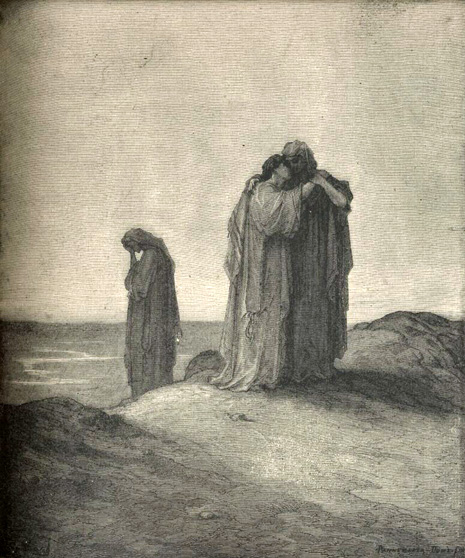
Then she arose with her daughters in law that she might return from the country of Moab for she had heard in the country of Moab how that the Lord had visited his people in giving them bread. Wherefore she went forth out of the place where she was, and her two daughters in law with her; and they went on the way to return unto the land of Judah.
And Naomi said unto her two daughters in law, Go, return each to her mother's house the Lord deal kindly with you, as ye have dealt with the dead, and with me. The Lord grant you that ye may find rest, each of you in the house of her husband.
Then she kissed them; and they lifted up their voice, and wept. And they said unto her, surely we will return with thee unto thy people.
And Naomi said, Turn again, my daughters: why will ye go with me? Are there yet any more sons in my womb, that they may be your husband's? Turn again, my daughters, go your way; for I am too old to have a husband. If I should say, I have hope, if I should have a husband also to night, and should also bear sons; would ye tarry for them till they were grown? Would ye stay for them from having husbands? Nay, my daughters; for it grieveth me much for your sakes that the hand of the Lord is gone out against me.
And they lifted up their voice, and wept again: and Orpah kissed her mother in law but Ruth cleave unto her.
And she said, Behold, thy sister in law is gone back unto her people, and unto her gods return thou after thy sister in-law.
And Ruth said, Entreat me not to leave thee, or to return from following after thee: for whither thou goest, I will go; and where thou lodgest, I will lodge: thy people shall be my people, and thy God my God: Where thou diest, will I die, and there will I be buried: the Lord do so to me, and more also, if ought but death part thee and me.
When she saw that she was steadfastly minded to go with her, then she left speaking unto her.
So they two went until they came to Beth-lehem.
Ruth i, 1-19
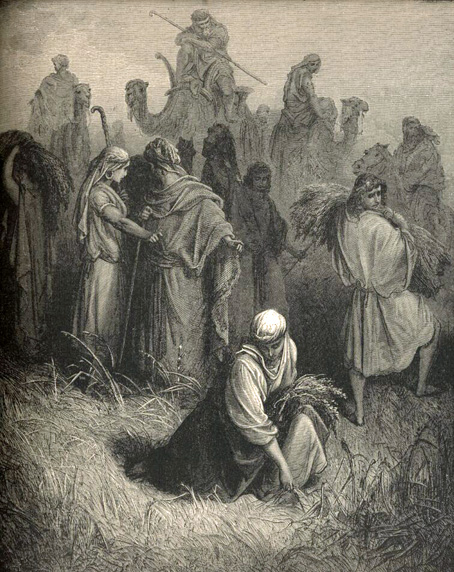
And Ruth the Moabitess said unto Naomi Let me now go to the field, and glean ears of corn after him in whose sight I shall find grace. And she said unto her, Go, my daughter. And she went, and came and gleaned in the field after the reapers; and her hap was to light on a part of the field belonging unto Boaz, who was of the kindred of Elimelech.
And, behold, Boaz came from Bethlehem, and said unto the reapers, The Lord be with you. And they answered him, The Lord bless thee. Then said Boaz unto his servant that was set over the reapers, whose damsel is this? And the servant that was set over the reapers answered and said, It is the Moabitish damsel that came back with Naomi out of the country of Moab: and she said, I pray you, let me glean and gather after the reapers among the sheaves: so she came, and hath continued even from the morning until now, that she tarried a little in the house.
Then said Boaz unto Ruth, Hearest thou not, my daughter? Go not to glean in another field, neither go from hence, but abide here fast by my maidens: let thine eyes be on the field that they do reap, and go thou after them: have I not charged the young men that they shall not touch thee? And when thou art athirst, go unto the vessels, and drink of that which the young men have drawn.
Then she fell on her face and bowed herself to the ground, and said unto him, Why have I found grace in thine eyes, that thou shouldest take knowledge of me, seeing I am a stranger?
And Boaz answered and said unto her, it hath fully been showed me, all that thou hast done unto thy mother in law since the death of thine husband: and how thou hast left thy father and thy mother, and the land of thy nativity, and art come unto a people which thou knewest not heretofore. The Lord recompense thy work, and a full reward be given thee of the Lord God of Israel, under whose wings thou art come to trust.
Then she said, Let me find favor in thy sight, my lord; for that thou hast comforted me, and for that thou hast spoken friendly unto thine handmaid, though I be not like unto one of thine handmaidens.
And Boaz said unto her, at mealtime come thou hither, and eat of the bread, and dip thy morsel in the vinegar. And she sat beside the reapers: and he reached her parched corn, and she did eat, and was sufficed, and left. And when she was risen up to glean, Boaz commanded his young men, saying, let her glean even among the sheaves, and reproach her not: and let fall also some of the handfuls of purpose for her, and leave them, that she may glean them and rebuke her not.
So she gleaned in the field until even, and beat out that she had gleaned: and it was about an ephah of barley.
Ruth ii, 1-17
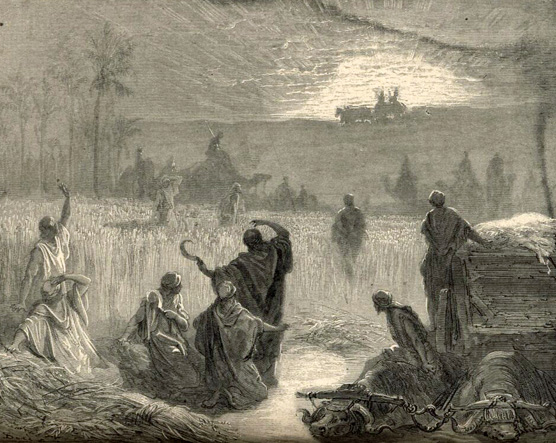
And the men did so; and took two milch kine, and tied them to the cart, and shut up their calves at home: and they laid the ark of the Lord upon the cart, and the coffer with the mice of gold and the images of their emerods. And the kine took the straightway to the way of Beth-shemesh, and went along the highway, lowing as they went, and turned not aside to the right hand or to the left; and the lords of the Philistines went after them, unto the border of Beth-shemesh. And they of Beth-shemesh were reaping their wheat harvest in the valley: and they lifted up their eyes, and saw the ark, and rejoiced to see it. And the cart came into the field of Joshua, a Beth-shemite, and stood there, where there was a great stone: and they clave the wood of the cart, and offered the kine a burnt offering unto the Lord.
And the Levites took down the ark of the Lord, and the coffer that was with it, wherein the jewels of gold were, and put them on the great stone: and the men of Beth-shemesh offered burnt offerings and sacrificed sacrifices the same day unto the Lord.
1 Samuel vi, 1-5
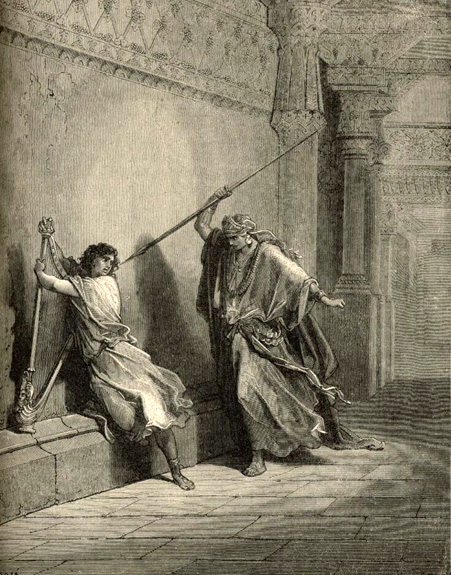
Then Jonathan and David made a covenant, because he loved him as his own soul. And Jonathan stripped himself of the robe that was upon him, and gave it to David, and his garments, even to his sword, and to his bow, and to his girdle.
And David went out withers ever Saul sent him, and behaved himself wisely: and Saul set him over the men of war, and he was accepted in the sight of all the people, and also in the sight of Saul's servants.
And it came to pass as they came, when David was returned from the slaughter of the Philistine, that the women came out of all cities of Israel, singing and dancing, to meet King Saul, with labrets, with joy, and with instruments of music. And the women answered one another as they played, and said, Saul hath slain his thousands, and David his ten thousands.
And Saul was very wroth, and the saying displeased him; and he said, "They have ascribed unto David ten thousands, and to me they have ascribed but thousands: and what can he have more but the kingdom?" And Saul eyed David from that day and forward.
And it came to pass on the morrow, that the evil spirit from God came upon Saul, and he prophesied in the midst of the house: and David played with his hand, as at other times: and there was a javelin in Saul's hand. And Saul cast the javelin; for he said, I will smite David even to the wall with it. And David avoided out of his presence twice.
1 Samuel xviii, I-II
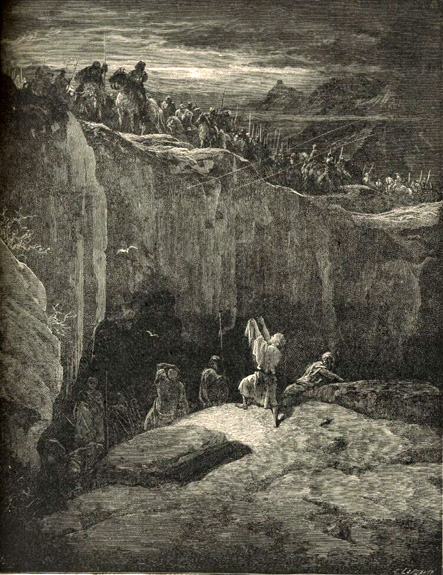
And the men of David said unto him, Behold the day of which the Lord said unto thee, Behold, I will deliver thine enemy into thine hand, that thou may do to him as it shall seem good unto thee. Then David arose, and cut off the skirt of Saul's robe secretly. And it came to pass afterward, that David's heart smote him, because he had cut off Saul's skirt. And he said unto his men, The Lord forbid that I should do this thing unto my master, the Lord's anointed, to stretch forth mine hand against him, seeing he is the anointed of the Lord.
So David stayed his servants with these words, and suffered them not to rise against Saul. But Saul rose up out of the cave, and went on his way. David also arose afterward, and went out of the cave, and cried after Saul, saying, my lord the king. And when Saul looked behind him, David stooped with his face to hearth and bowed himself.
And David said to Saul, Wherefore hearest thou men's words, saying, Behold, David seeketh thy hurt? Behold, this day thin eyes have seen how that the Lord had delivered thee to-day into mine hand in the cave: and some bade me kill thee; but mine eye spared thee; and I said, I will not put forth mine hand against my lord; for he is the Lord's anointed. Moreover, my father, see, yea, see the skirt of thy robe in my hand: for in that I cut off the skirt of thy robe, and killed thee not, know thou and see that there is neither evil nor transgression in mine hand, and I have not sinned against thee; yet thou huntest my soul to take it. The Lord judge between me and thee, and the Lord avenge me of thee: but mine hand shall not be upon thee. As saith the proverb of the ancients, Wickedness proceedeth from the wicked: but mine hand shall not be upon thee. After whom is the king of Israel come out? After whom dost thou pursue? After a dead dog, after a flea. The Lord therefore be judge, and judge between me and thee, and see, and plead my cause, and deliver me out of thin hand.
And it came to pass, when David had made an end of speaking these words unto Saul, that Saul said, Is this thy voice, my son David? And Saul lifted up his voice, and wept. And he said to David, Thou art more righteous than I: for thou hast rewarded me well, whereas I have rewarded thee evil. And thou hast showed this day how that thou hast dealt well, with me: forasmuch as when the Lord had delivered me into thine hand, thou killed me not. For if a man finds his enemy, will he let him go well away? Wherefore the Lord rewards thee well for that thou hast done unto me this day. And now, behold, I know well that thou shalt surely be king, and that the kingdom of Israel shall be established in thine hand. Swear now therefore unto me by the Lord, that thou wilt not cut off my seed after me, and that thou wilt not destroy my name out of my father's house.
And David swore unto Saul. And Saul went home; but David and his men got them up unto the hold.
2 Samuel xxiv, 2-22
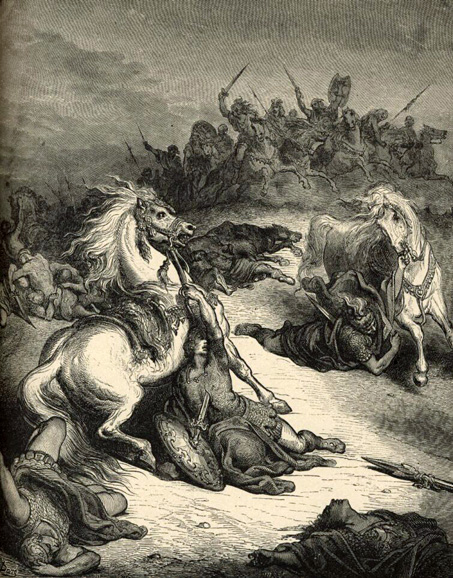
And the battle went sore against Saul, and the archer's hit him; and he was sore wounded of the archers. Then said Saul unto his armor bearer, Draw thy sword, and thrust me through therewith; lest these uncircumcised come and thrust me through, and abuse me. But his armor bearer would not; for he was sore afraid. Therefore, Saul took a sword, and fell upon it. And when his armor bearer saw that Saul was dead, he fell likewise upon his sword, and died with him.
So Saul died, and his three sons, and his armor bearer, and all his men, that same day together.
And when the men of Israel that were on the other side of the valley, and they that were on the other side Jordan, saw that the men of Israel fled, and that Saul and his sons were dead, they forsook the cities, and fled; and the Philistines came and dwelt in them. And it came to pass on the morrow, when the Philistines came to strip the slain, that they found Saul and his three sons fallen in mount Gilboa. And they cut off his head and stripped off his armor, and sent into the land of the Philistines roundabout, to publish it in the house of their idols, and among the people. And they put his armor in the house of Ashtoreth and they fastened his body to the wall of Beth-shan.
And when the inhabitants of Jabesh-gilead heard of that which the Philistines had done to Saul; all the valiant men arose, and went all night, and took the body of Saul and the bodies of his sons from the wall of Beth-shan, and came to Jabesh, and burnt them there. And they took their bones, and buried them under a tree at Jabesh, and fasted seven days.
1 Samuel xxxi
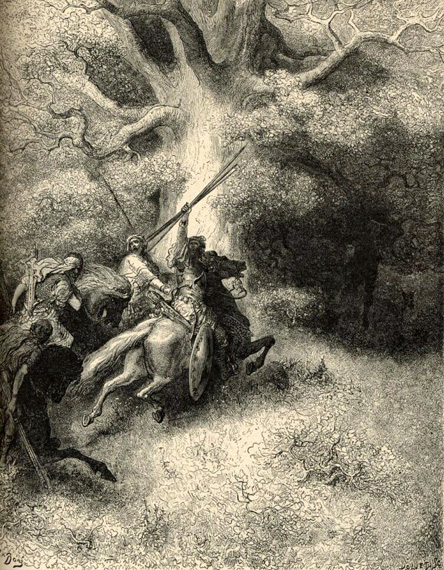
But the people answered, Thou shalt not go forth: for if we flee away, they will not care for us; neither if half of us die, will they care for us: but now thou art worth ten thousand of us: therefore now it is better that thou succor us out of the city.
And the king said unto them, what seemeth you best I will do. And the king stood by the gate side, and all the people came out by hundreds and by thousands. And the king commanded Joab and Abishai and Ittai, saying, Deal gently for my sake with the young man, even with Absalom. And all the people heard when the king gave all the captains charge concerning Absalom.
So the people went out into the field against Israel: and the battle was in the wood of Ephraim; where the people of Israel were slain before the servants of David, and there was there a great slaughter that day, of twenty thousand men. For the battle was there scattered over the face of all the country: and the wood devoured more people that day than the sword devoured.
And Absalom met the servants of David. And Absalom rode upon a mule, and the mule went under the thick boughs of a great oak, and his head caught hold of the oak, and he was taken up between the heaven and the earth; and the mule that was under him went away.
And a certain man saw it, and told Joab, and said, Behold Isaw Absalom hanged in an oak.
And Joab said unto the man that told him, And, behold, thou saw him, and why didst thou not smite him there to the ground? and I would have given thee ten shekels of silver, and a girdle.
And the man said unto Joab, Though I should receive a thousand shekels of silver in mine hand, yet would I not put forth mine hand against the king's son: for in our hearing the king charged thee and Abishai and Ittai, saying, Beware that none touch the young man Absalom. Otherwise I should have wrought falsehood against mine own life: for there is no matter hid from the king, and thou thyself wouldst have set thyself against me.
Then said Joab, I may not tarry thus with thee. And he took three darts in his hand, and thrust them through the heart of Absalom, while he was yet alive in the midst of the oak. And ten young men that bare Joab's armor compassed about and smote Absalom, and slew him. And Joab blew the trumpet, and the people returned from pursuing after Israel: for Joab held back the people. And they took Absalom, and cast him into a great pit in the wood, and laid a very great heap of stones upon him: and all Israel fled everyone to his tent.
2 Samuel xviii, 1-17
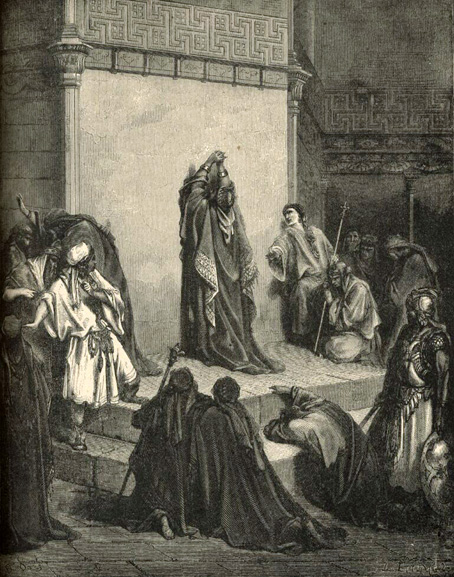
And David sat between the two gates: and the watchman went up to the roof over the gate unto the wall, and lifted up his eyes, and looked, and beholds a man running alone. And the watchman cried, and told the king. And the king said, if he be alone, there is tidings in his mouth. And he came apace, and drew near. And the watchman saw another man running: and the watchman called unto the porter, and said, Behold another man running alone. And the king said, He also brings tidings. And the watchman said, I think the running of the foremost is like the running of Ahimaaz the son of Zadok. And the king said, He is a good man, and cometh with good tidings.
And Ahimaaz called, and said unto the king, all is well. And he fell down to the earth upon his face before the king, and said, blessed be the Lord thy God, which hath delivereth up the men that lifted up their hand against my lord the king. And the king said, Is the young man Absalom safe? And Ahimaaz answered, When Joab sent the king's servant and me thy servant, I saw a great tumult, but I knew not what it was. And the king said unto him, Turn aside, and stand here. And he turned aside, and stood still.
And, behold, Cushi came; and Cushi said, Tidings, my lord theking: for the Lord bath avenged thee this day of all them that rose up against thee. And the king said unto Cushi, Is the young man Absalom safe? And Cushi answered, The enemies of my lord the king, and all that rise against thee to do thee hurt, be as that young man is.
And the king was much moved, and went up to the chamber over the gate, and wept: and as he went, thus he said, O my son Absalom, my son, my son Absalom! Would God I had died for thee, OAbsalom, my son, my son!
And it was told Joab, Behold the king weepeth and mourneth forAbsalom. And the victory that day was turned into mourning unto all the people: for the people heard say that day how the king was grieved for his son. And the people got them by stealth that day into the city, as people being ashamed steal away when they flee in battle.
But the king covered his face, and the king cried with a loud voice, O my son Absalom, O Absalom, my son, my son!
2 Samuel xviii, 19 33; xix, 1-4
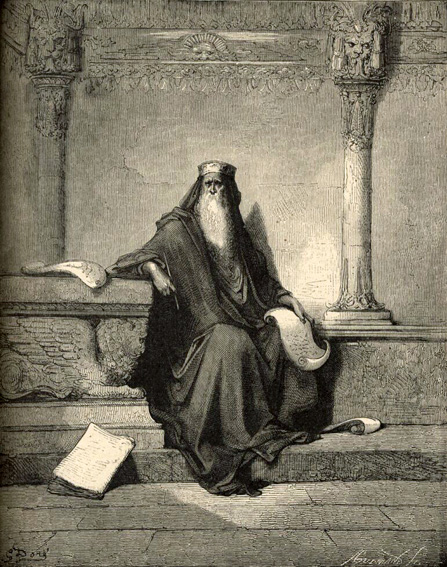
2 Samuel v, 13-16
And David comforted Bath-sheba his wife, and went in unto her, and lay with her: and she bore a son, and he called his name Solomon: and the Lord loved him.
2 Samuel xii, 24
So David slept with his fathers, and was buried in the city of David. And the days that David reigned over Israel were forty years: seven years reigned he in Hebron, and thirty and three years reigned he in Jerusalem.
Then sat Solomon upon the throne of David his father, and his kingdom was established greatly.
1 Kings ii, 10-12
And God gave Solomon wisdom and understanding exceeding much, and largeness of heart, even as the sand that is on the seashore. And Solomon's wisdom excelled the wisdom of all the children of the east country, and all the wisdom of Egypt. For he was wiser than all men; than Ethan the Ezrahite, and Heman, and Chalcol, and Darda, the sons of Mahol: and his fame was in all nations round about. And he spoke three thousand proverbs: and his songs were a thousand and five. And he spoke of trees, from the cedar tree that is in Lebanon even unto the hyssop that springs out of the wall: he spoke also of beasts, and of fowl, and of creeping things, and of fishes. And there came of all people to hear the Wisdom of Solomon, from all kings of the earth, which had heard of his wisdom.
2 Kings iv, 29-34
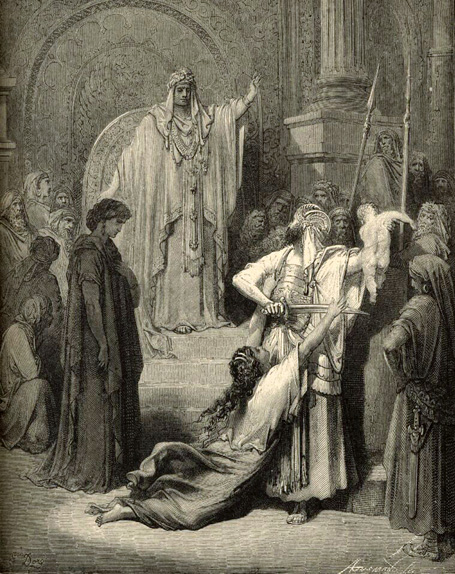
And the one woman said, O my lord, I and this woman dwell in one house; and I was delivered of a child with her in the house. And it came to pass the third day after that I was delivered, that this woman was delivered also: and we were together; there was no stranger with us in the house, save we two in the house. And this woman's child died in the night; because she overlaid it. And she arose at midnight, and took my son from beside me, while thine handmaid slept, and laid it in her bosom, and laid her dead child in my bosom. And when I rose in the morning to give my child suck, behold, it was dead: but when I had considered it in the morning, behold, it was not my son, which I did bear.
And the other woman said, Nay; but the living is my son, and the dead is thy son.
And this said, No; but the dead is thy son, and, the living is my son.
Thus they spoke before the king.
Then said the king, The one said, This is my son that lives, and thy son is the dead-and the other said, Nay; but thy son is the dead, and my son is the living. And the king said, Bring me a sword.
And they brought a sword before the king.
And the king said, Divide the living child in two, and give half to the one, and half to the other.
Then spoke the woman whose the living child was unto the king, for her bowels yearned upon her son, and she said, O my lord, give her the living child, and in no wise slay it.
But the other said, Let it be neither mine nor thine, but divide it.
Then the king answered and said, Give her the living child, and in no wise slay it she is the mother thereof.
And all Israel heard of the judgment which the king had judged; and they feared the king: for they saw that the wisdom of God was in him, to do judgment.
1 Kings iii, 16-28
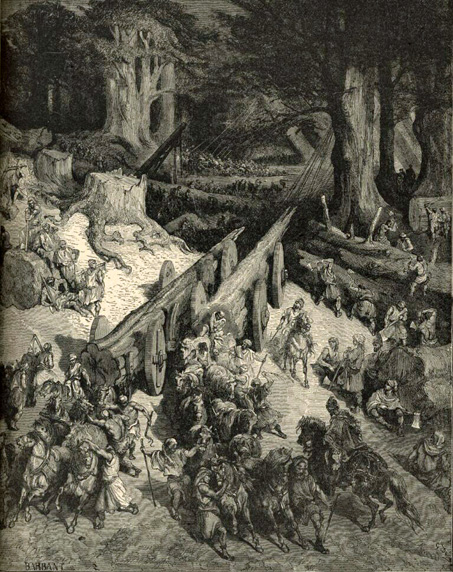
And Solomon sent to Hiram, saying, Thou knows how that David my father could not build a house unto the name of the Lord his God for the wars which were about him on every side, until the Lord put them under the soles of his feet. But now the Lord my God hath given me rest on every side, so that there is neither adversary nor evil occurrent. And, behold: I purpose to build a house unto the name of the Lord my God, as the Lord spoke unto David my father, saying, Thy son, whom I will set upon thy throne in thy room, he shall build a house unto my name. Now therefore command thou that they hew me cedar trees out of Lebanon; and my servants shall be with thy servants: and unto thee will I give hire for the servants according to all that thou shalt appoint: for thou knows that there is not among us any that can skill to hew timber like unto the Sidonians.
And it came to pass, when Hiram heard the words of Solomon, that he rejoiced greatly and said, blessed be the Lord this day, which hath given unto David a wise son over this great, people. And Hiram sent to Solomon, saying, I have considered the things which thou sent to me for: and I will do all thy desire concerning timber of cedar, and concerning timber of fir: My servants shall bring them down from Lebanon unto the sea; and I will convey them by sea in floats unto the place that thou shalt appoint me, and will cause them to be discharged there, and thou halt receive them: and thou shalt accomplish my desire, in giving food for my household.
So Hiram gave Solomon cedar trees and fir trees according to all his desire.
And Solomon gave Hiram twenty thousand measures of wheat for food to his household and twenty measures of pure oil: thus gave Solomon to Hiram year by year.
And the Lord gave Solomon wisdom, as he promised him: and there was peace between Hiram and Solomon; and they two made a league together.
And King Solomon raised a levy out of all Israel; and the levy was thirty thousand men. And he sent them to Lebanon, ten thousand a month by courses: a month they were in Lebanon, and two months at home: and Adoniram was over the levy. And Solomon had three score and ten thousand that bare burdens, and fourscore thousand hewers in the mountains beside the chief of Solomon's officers which were over the work, three thousand and three-hundred, which ruled over the people that wrought in the work. And the king commanded and they brought great stones, costly stones, and hewed stones, to lay the foundation of the' house. And Solomon's builders, and Hiram's builders did hew them, and the stone-squarers; so they prepared timber and stones to build the house.
1 Kings v
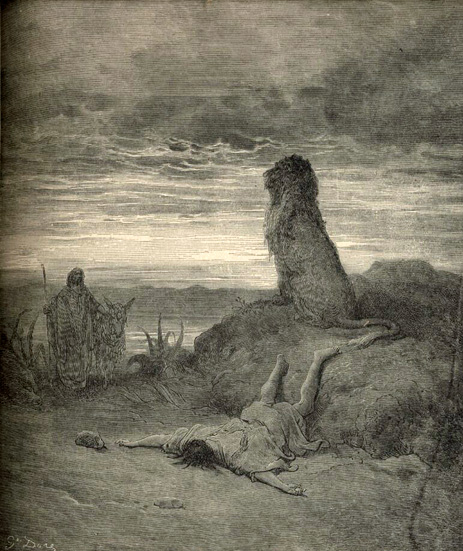
And it came to pass, as they sat at the table, that the word of the Lord came unto the prophet that brought him back: and he cried unto the man of God that came from Judah, saying, Thus said the Lord, Forasmuch as thou hast disobeyed the mouth of the Lord, and hast not kept the commandment which the Lord thy God commanded thee, but came back, and hast eaten bread and drunk water in the place, of the which the Lord did say to thee, Eat no bread, and drink no water; thy carcass shall not come unto the sepulcher of thy fathers.
And it came to pass, after he had eaten bread, and after he had drunk, that he saddled for him the ass, to wit, for the prophet whom he had brought back.
And when he was gone, a lion met him by the way, and slew him: and his carcass was cast in the way, and the ass stood by it, the lion also stood by the carcass.
And, behold, men passed by, and saw the carcass cast in the way, and the lion standing by the carcass: and they came and told it in the city where the old prophet dwelt. And when the prophet that brought him back from the way heard thereof, he said, It is; the man of God, who was disobedient unto the word of the Lord: therefore the Lord hath delivered him unto the lion, which hath torn him, and slain him, according to the word of the Lord, which he spoke unto him. And he spoke to his sons, saying, Saddle me the ass. And they saddled him.
And he went and found his carcass cast in the way, and the ass and the lion standing by the carcass: the lion had not eaten the carcass, nor torn the ass.
2 Kings xiii, II-28
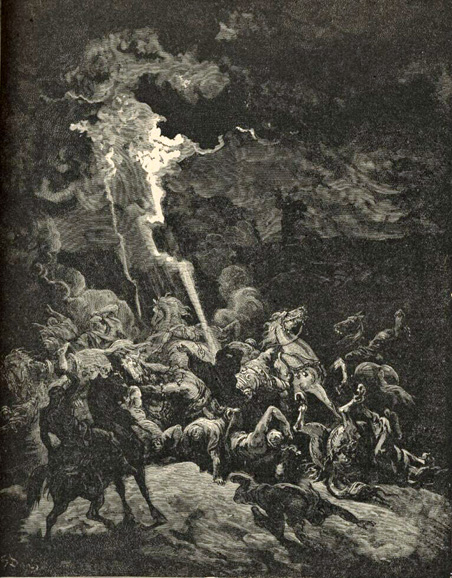
But the angel of the Lord said to Elijah the Tishbite, Arise, go up to meet the messengers of the king of Samaria, and say unto them, Is it not because there is not a God in Israel, that 'ye go to enquire of Baal-zebub the god of Ekron? Now therefore thus said the Lord, Thou; shalt not come down from that bed on which thou art gone up, but shalt surely die. And Elijah departed.
And when the messengers turned back unto him, he said unto them, why are ye now turned back? And they said unto him, There came a man up to meet us, and said unto us, Go, turn again unto the king that sent you, and say unto him, Thus said the Lord, Is it not because there is not a God in Israel, that thou sends to enquire of Baal-zebub the god of Ekron? Therefore thou shalt not come down from that bed on which thou art gone up, but shalt surely die. And he said unto them, what manner of man was he which came up to meet you, and told you these words? And they answered him, He was a hairy man, and girt with a girdle of leather about his loins. And he said it is Elijah the Tishbite.
Then the king sent unto him a captain of fifty with his fifty. And he went up to him and, behold, he sat on the top of a hill. And he spoke unto him, Thou man of God, the king hath said, Comedown. And Elijah answered and said to the captain of fifty, if I be a man of God, then let fire come down from heaven, and consume thee and thy fifty. And there came down fire from heaven and consumed him and his fifty.
Again also he sent unto him another captain of fifty with his fifty. And he answered and said unto him, O man of God, thus hath the king said, come down quickly. And Elijah answered and said unto them, if I be a man of God, let fire come down from heaven, and consume thee and thy fifty. And the fire of God came down from heaven and consumed him and his fifty.
And he sent again a captain of the third fifty with his fifty. And the third captain of fifty went up, and came and fell on his knees before Elijah, and besought him, and said unto him, O man of God, I pray thee, let my life, and the life of these fifty thy servants, be precious in thy sight. Behold, there came fire down from heaven, and burnt up the two captains of the former fifties with their fifties: therefore let my life now is precious in thy sight.
And the angel of the lord said unto Elijah, Go down with him: be not afraid of him. And he arose, and went down with him unto the king. And he said unto him, Thus said the Lord, Forasmuch as thou hast sent messengers to enquire of Baal-zebub the god of Ekron, is it not because there is no God in Israel to enquire of his word? Therefore thou shalt not come down off that bed on which thou art gone up, but shalt surely die.
So he died according to the word of the Lord which Elijah hadspoken.
2 Kings i, 2-17
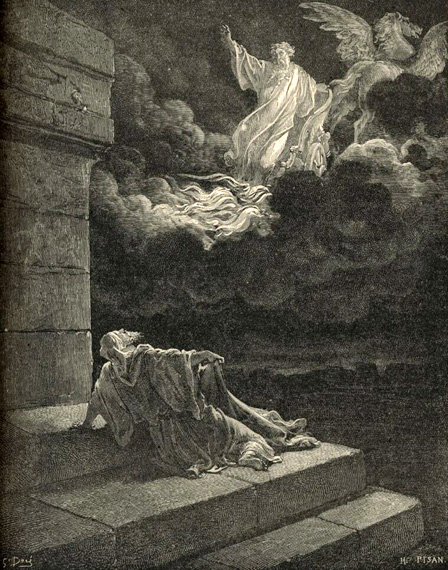
And the sons of the prophets that were at Beth-el came forth to Elisha, and said unto him, Know thou that the Lord will take away thy master from thy head to-day? And he said, Yea, I know it; hold ye your peace. And Elijah said unto him, Elisha, tarry here, I pray thee; for the Lord hath sent me to Jericho. And he said, As the Lord lives, and as thy soul lives, I will not leave thee. So they came to Jericho.
And the sons of the prophets that were at Jericho came to Elisha, and said unto him, Know thou that the Lord will take away thy master from thy head to-day? And he answered, Yea, I know it; hold ye your peace. And Elijah said unto him, Tarry, I pray thee, here; for the Lord hath sent me to Jordan. And he said, As the Lord lives, and as thy soul lives, I will not leave thee. And they two went on.
And fifty men of the sons of the prophets went, and stood to view afar off and they two stood by Jordan.
And Elijah took his mantle, and wrapped it together, and smote the waters, and they were divided hither and thither, so that they two went over on dry ground.
And it came to pass, when they were gone over, that Elijah said unto Elisha, Ask what I shall do for thee, before I be taken away from thee. And Elisha said, I pray thee, let a double portion of thy spirit be upon me. And he said, Thou hast asked a hard thing: nevertheless, if thou see me when I am taken from thee, it shall be so unto thee; but if not, it shall not be so.
And it came to pass, as they still went on, and talked, that, behold, there appeared a chariot of fire, and horses of fire, and parted them both asunder; and Elijah went up by a whirlwind into heaven.
2 Kings ii, I-II
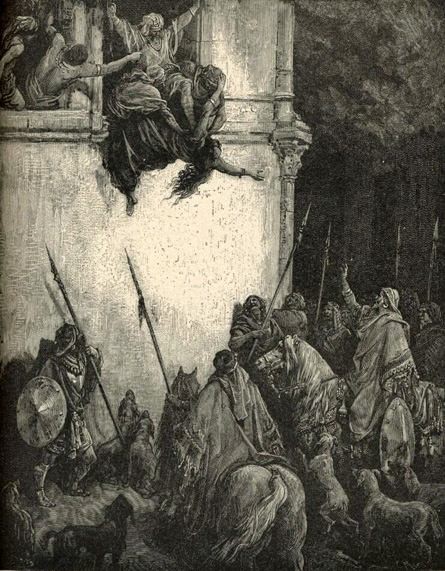
And he lifted up his face to the window, and said, who is on my side? Who? And there looked out to him two or three eunuchs. And he said, Throw her down. So they threw her down: and some of her blood was sprinkled on the wall and on the horses and he trod her under foot. And when he was come in, he did eat and drink, and said, go, see now this cursed woman, and bury her: for she is a king's daughter. And they went to bury her: but they found no more of her than the skull, and the feet, and the palms of her hands. Wherefore they came again, and told him. And he said, This is the word of the Lord, which he spoke by his servant Elijah the Tishbite, saying, In the portion of Jezreel shall dog seat the flesh of Jezebel: and the carcass of Jezebel shall be as dung upon the face of the field in the portion of Jezreel; so that they shall not say, This is Jezebel.
2 Kings ix, 30-37
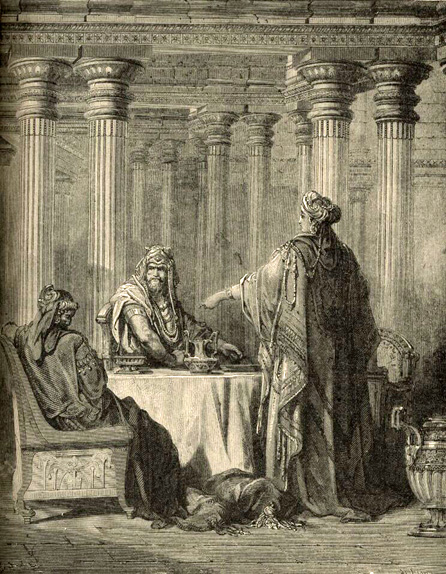
And the king said again unto Esther on the second day at the banquet of wine What is thy petition, queen Esther? And it shall be granted thee: and what is thy request? And it shall be performed, even to the half of the kingdom.
Then Esther the queen answered and said, If I have found favor in thy sight, O king, and if it please the king, let my life be given me at my petition, and my people at my request: for we are sold, I and my people, to be destroyed, to be slain, and to perish. But if we had been sold for bondmen and bondwomen, I had held my tongue although the enemy could not countervail the king's damage.
Then the king Ahasuerus answered and said unto Esther the queen, Who is he, and where is he, that durst presume in his heart to do so?
And Esther said, The adversary and enemy is this wicked Haman.
Then, Haman was afraid before the king and the queen. And the king arising from the banquet of wine in his wrath went into the palace garden: and Haman stood up to make request for his life to Esther the queen; for he saw that there was evil determined against him by the king.
Then the king returned out of the palace garden into the place of the banquet of wine; and Haman was fallen upon the bed whereon Esther was. Then said the king, Will he force the queen also before me in the house?
As the word went out of the king's mouth, they covered Haman's face. And Harbonah, one of the chamberlains, said before the king, Behold also, the gallows fifty cubits high, which Haman had made for Mordecai, who had spoken good for the king, stands in the house of Haman. Then the king said, Hang him thereon.
So they hanged Haman on the gallows that he had prepared for Mordecai. Then was the king's wrath pacified.
Esther vii
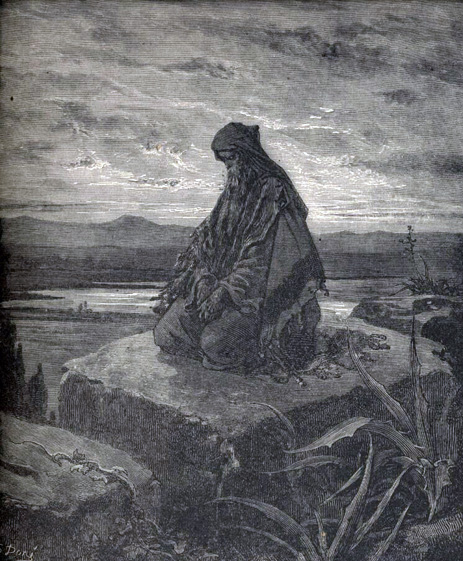
But by most competent critics it is now held that the last twenty-seven chapters (40-66) of the book bearing his name were the work, not of the prophet, but of a later writer who is commonly styled the second or Deutero-Isaiah. In this portion of the book, Cyrus, who was not born till after 600 B.C., is mentioned by name (Isaiah, xliv, 28; xlv, i); and events which did not take place till a century after the prophet's death are referred to as happening contemporaneously with the writer's account of them. The style of these last twenty-seven chapters, also, is different, and the tone is more elevated and spiritual.
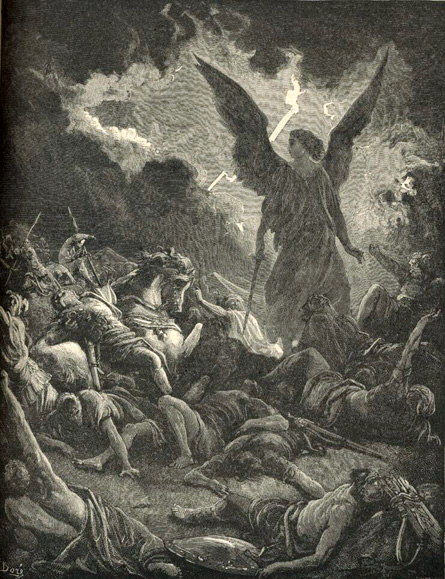
And it came to pass that night that the angel of the Lord went out, and smote in the camp of the Assyrians an hundred fourscore and five thousand: and when they arose early in the morning, behold, they were all dead corpses.
So Sennacherib king of Assyria departed, and went and returned, and dwelt at Nineveh. And it came to pass, as he was worshipping in the house of Nisroch his god, that Adrammelech and Sharezer his sons smote him with the sword: and they escaped into the land of Armenia. And Esar-hadd on his son reigned in his stead.
2 Kings xix, 32-37
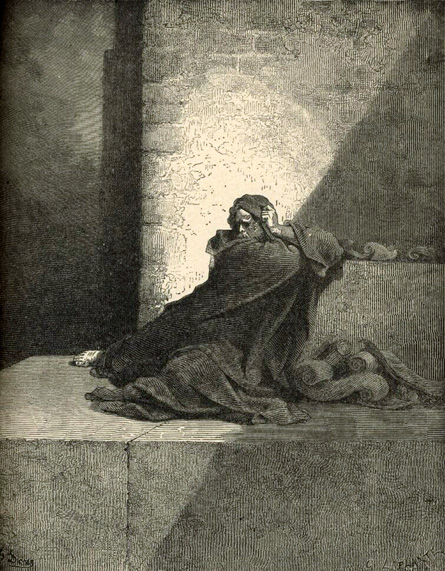
Then Jeremiah called Baruch the son of Neriah: and Baruch wrote from the mouth of Jeremiah all the words of the Lord, which he had spoken unto him, upon a roll of a book.
Jeremiah xxxvi;1-4
The word that Jeremiah the prophet spake unto Baruch the son of Neriah, when he had written these words in a book at the mouth of Jeremiah, in the fourth year of Jehoiakim the son of Josiahking of Judah, saying, Thus said the Lord, the God of Israel, unto thee, O Baruch; thou didst say, Woe is me now! For the Lord hath added grief to my sorrow; I fainted in my sighing, and I find no rest. Thus shalt thou say unto him, The Lord said thus; Behold, that which I have built will I break down, and that which I have planted I will pluck up, even this whole land. And sleek thou great things for thyself? Seek them not: for, behold, I will bring evil upon all flesh, said the Lord: but thy life will I give unto thee for a prey in all places whither thou goest.
Jeremiah xlv, 1-5
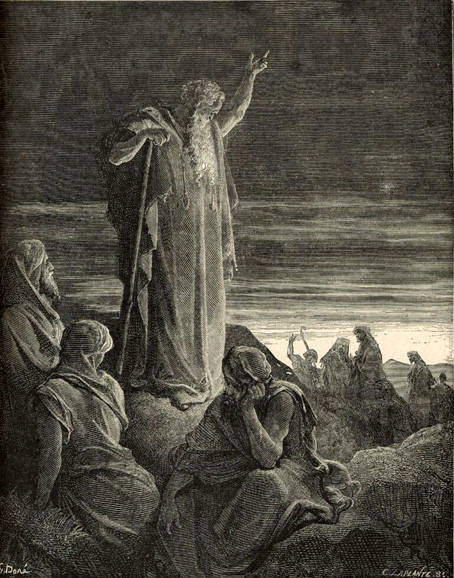
The book bearing his name is written in a mystical and symbolical style, and abounds with visions and difficult allegories which indicate on the part of the author the possession of a vivid and sublime imagination. Ezekiel's authorship of it has been questioned. The Talmud attributes it to the Great Synagogue, of which Ezekiel was not a member. It is divisible into two portions. The first (chapters i-xxiv) was written before, and the second (chapters xxv-xlviii) after, the destruction of Jerusalem by Nebuchadnezzar in 586 B.C, the eleventh year of the prophet's captivity (Ezekiel xxvi, 1-2; XI,i). The present text is very imperfect, being corrupted by the interpolation of glosses and other additions by later hands.
Dore's picture represents the prophet uttering his oracles to his fellow-exiles ("them of the captivity"), or to the "elders of Judah," or "elders of Israel," on one of the occasions to which he himself alludes.
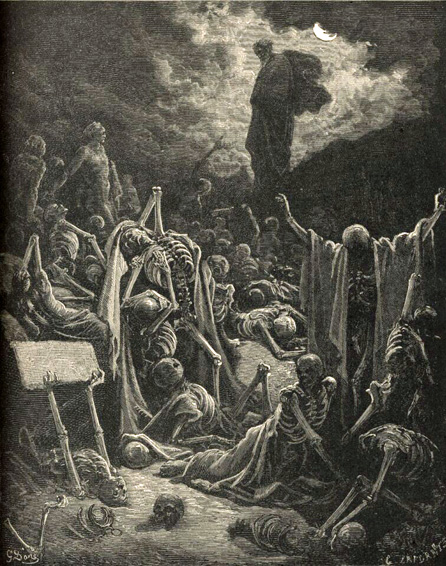
And he said unto me; Son of Man, can these bones live? And I answered, O Lord God, thou knowest.
Again he said unto me, Prophesy upon these bones, and say unto them, O ye dry bones, hear the word of the Lord. Thus said the Lord God unto these bones; Behold, I will cause breath to enter into you, and ye shall live: And I will lay sinews upon you, and will bring up flesh upon you, and cover you with skin, and put breath in you, and ye shall live and ye shall know that I am the Lord.
So I prophesied as I was commanded: and as I prophesied, there was a noise, and behold a shaking, and the, bones came together, bone to his bone. And when I beheld, lo, the sinews and the flesh came up upon them, and the skin covered them above: but there was no breath in them.
Then said he unto me, Prophesy unto the wind, prophesy, son of man, and say to the wind, Thus said the Lord God; Come from the four winds, O breath, and breathe upon these slain, that they may live.
So I prophesied as he commanded me, and the breath came into them, and they lived, and stood up upon their feet, an exceeding great army.
Then he said unto me, Son of Man, these bones are the whole house of Israel: behold, they say, our bones are dried, and our hope is lost: we are cut off for our parts. Therefore prophesy and say unto them, Thus said the Lord God; Behold, O my people, I will open your graves, and cause you to come up out of your graves, and bring you into the land of Israel. And ye shall know that I am the Lord, when I have opened your graves, O my people, and brought you up out of your graves, and shall put my Spirit in you, and ye shall live, and I shall place you in your own land: then shall ye know that I the Lord have spoken it, and performed it, said the Lord.
Ezekiel xxxvii, 1-14
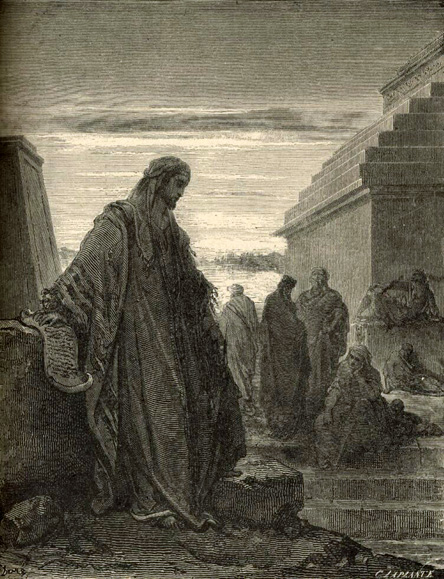
The book of Daniel is written partly in Chaldaic or Syriac (the vernacular Aramaic language spoken by the people of Palestine), and partly in sacred Hebrew. It is manifestly divisible into two portions. The first (chapters i-vi) narrating the details of the prophet's life, and the second (chaptersvii-xii) setting forth his apocalyptic visions. Much doubt has-been cast upon the authenticity of the work. The evident reference in the eleventh chapter to the conquest of Persia by Alexander the Great, which took place about 330 B.C., or more than two hundred years after Daniel flourished, has led many modern critics to believe that the work was composed in the time of the Maccabees.
Dore's picture appears to be intended to represent the prophet meditating over one of the many visions which came to him.
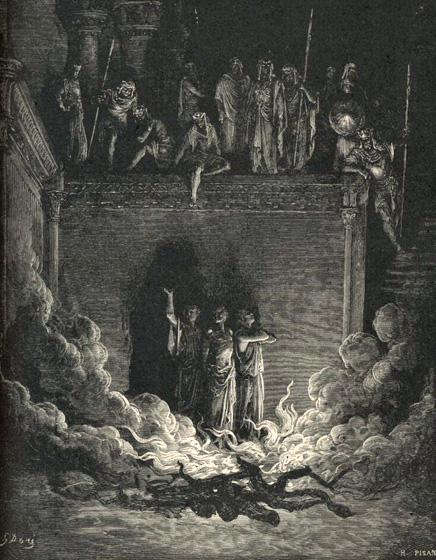
Then Nebuchadnezzar in his rage and fury commanded to bring Shadrach, Meshach, and Abed-nego. Then they brought these men before the king.
Nebuchadnezzar spoke and said unto them, Is it true, O Shadrach, Meshach, and Abed-nego? Do not ye serve my gods, nor worship the golden image which I have set up? Now if ye be ready that at what time ye hear the sound of the cornet, flute, harp, sackbut, psaltery, and dulcimer, and all kinds of music, ye fall down and worship the image which I have made; well: but if ye worship not, ye shall be cast the same hour into the midst of a burning fiery furnace; and who is that God that shall deliver you out of my hands?
Shadrach, Meshach, and Abed-nego, answered and said to the king, O Nebuchadnezzar, we are not careful to answer thee in this matter. If it be so, our God whom we serve is able to deliver us from the burning fiery furnace, and he will deliver us out of thine hand, O king. But if not, be it known unto thee, O king that we will not serve thy gods, nor worship the golden image which thou hast set up.
Then was Nebuchadnezzar full of fury, and the form of his visage was changed against Shadrach, Meshach, and Abed-nego: therefore he spoke, and commanded that they should heat the furnace one seven times more than it was wont to be heated. And he commanded the most mighty men that were in his army to bind Shadrach, Meshach, and Abed-nego, and to cast them into the burning fiery furnace.
Then these men were bound in their coats, their hosen, and their hats, and their other garments, and were cast into the midst of the burning fiery furnace. Therefore because the king's commandment was urgent and the furnace exceeding hot, the flame of the fire slew those men that took up Shadrach, Meshach, and Abed-nego. And these three men, Shadrach, Meshach, and Abed-nego fell down bound into the midst of the burning fiery furnace.
Then Nebuchadnezzar the king was astonished, and rose up in haste, and spoke, and said unto his counselors, did not we cast three men bound into the midst of the fire? They answered, and said unto the king, True, O king.
He answered and said, Lo, I see four men loose, walking in the midst of the fire, and they have no hurt; and the form of the fourth is like the Son of God.
Then Nebuchadnezzar came near to the mouth of the burning fiery furnace, and spoke, and said, Shadrach, Meshach, and Abed-nego, ye servants of the most high God, come forth and come hither. Then Shadrach, Meshach, and Abed-nego, came forth of the midst of the fire. And the princes, governors, and captains, and the king's counselors, being gathered together, saw these men, upon whose bodies the fire had no power, nor was a hair of their head singed, neither were their coats changed, nor the smell of fire had passed on them.
Daniel iii, 8, 9, 12-27
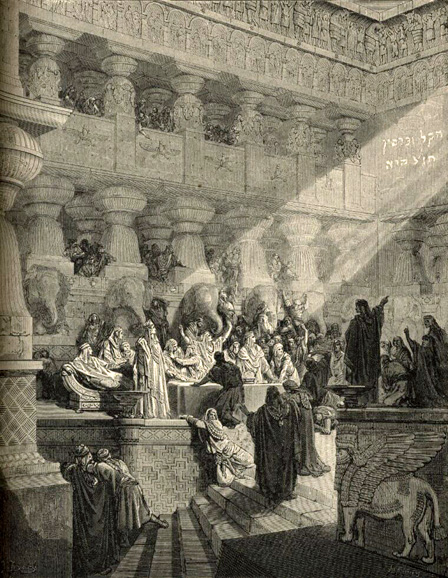
In the same hour came forth fingers of a man's hand, and wrote over against the candlestick upon the plaister of the wall of the king's palace: and the king saw the part of the hand that wrote. Then the king's countenance was changed, and his thoughts troubled him, so that the joints of his loins were loosed, and his knees smote one against another.
On the failure of his astrologers and soothsayers to interpret the writing, the king, at the suggestion of his queen, sends for Daniel, who interprets it as follows:
O thou king, the most high God gave Nebuchadnezzar thy father a kingdom, and majesty, and glory, and honor: and for the majesty that he gave him, all peoples, nations, and languages, trembled and feared before him: whom he would he slew; and whom he would he kept alive; and whom he would he set up; and whom he would he put down. But when his heart was lifted up, and his mind hardened in pride, he was deposed from his kingly throne, and they took his glory from him and he was driven from the sons of men; and his heart was made like the beasts, and his dwelling was with the wild asses: they fed him with grass like oxen, and his body was wet with the dew of heaven; till he knew that the most high God ruled in the kingdom of men, and that he appointed over it whomsoever he will.
And thou his son, O Belshazzar, hast not humbled thine heart, though thou knew all this; but hast lifted up thyself against the Lord of heaven; and they have brought the vessels of his house before thee, and thou, and thy lords, thy wives, and thy concubines, have drunk wine in them; and thou hast praised the gods of silver, and gold, of brass, iron, wood, and stone, which see not, nor hear, nor know: and the God in whose hand thy breath is, and whose are all thy ways, hast thou not glorified.
Then was the part of the hand sent from him; and this writing was written.
And this is the writing that was written, MENE, MENE, TEKEL,UPHARSIN. This is the interpretation of the thing: MENE; God hath numbered thy kingdom and finished it. TEKEL; Thou art weighed in the balances, and art found wanting. PERES; Thy kingdom is divided, and given to the Medes and Persians.
In that night was Belshazzar the king of the Chaldeans slain. And Darius the Median took the kingdom.
Daniel v
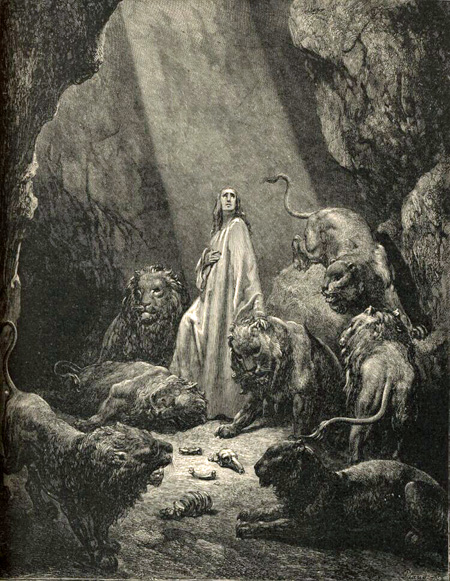
Then these men assembled, and found Daniel praying and making supplication before his God. Then they came near, and spoke before the king concerning the king's decree Hast thou not signed a decree, that every man that shall ask a petition of any God or man within thirty days, save of thee, O king, shall be cast into the den of lions.
The king answered and said, the thing is true, according to the law of the Medes and Persians, which altered not.
Then answered them and said before the king, That Daniel, which is of the children of the captivity of Judah, regarded not thee, O king, nor the decree that thou hast signed, but make his petition three times a day.
Then the king, when he heard these words, was sore displeased with himself, and set his heart on Daniel to deliver him: and he labored till the going down of the sun to deliver him.
Then these men assembled unto the king, and said unto the king, Know, O king, that the law of the Medes and Persians is, that no decree nor statute which the king established may be changed. Then the king commanded, and they brought Daniel and cast him into the den of lions. Now the king spoke and said unto Daniel, Thy God whom thou served continually, he will deliver thee. And a stone was brought, and laid upon the mouth of the den and the king sealed it with his own signet, and with the signet of his lords; that the purpose might not be changed concerning Daniel.
Then the king went to his palace, and passed the night fasting: neither were instruments of music brought before him: and his sleep went from him. Then the king arose very early in the morning, and went in haste unto the den of lions. And when he came to the den, he cried with a lamentable voice unto Daniel: and the king spoke and said to Daniel, O Daniel, servant of the living God, is thy God, whom thou serve continually, able to deliver thee from the lions?
Then said Daniel unto the King, O king, live forever. My God hath sent his angel, and hath shut the lions' mouths, that they have not hurt me: forasmuch as before him innocence was found in me; and also before thee, O king, have I done no hurt.
Then was the king exceeding glad for him, and commanded that they should take Daniel up out of the den. So Daniel was taken up out of the den, and no manner of hurt was found upon him, because he believed in his God. And the king commanded, and they brought those men which had accused Daniel, and they cast them into the den of lions, them, their children, and their wives; and the lions had the mastery of them, and brake all their bones in pieces or ever they came at the bottom of the den.
Daniel vi
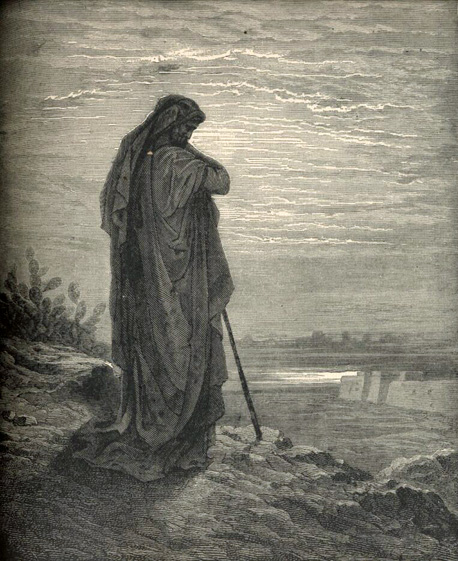
The first six chapters of his book contain his denunciations of idolatry; the other three, his symbolical vision of the overthrow of the people of Israel, and a promise of their restoration. The style is remarkable for clearness and strength, and for its picturesque use of images drawn from the rural and pastoral life which the prophet had led in his youth.
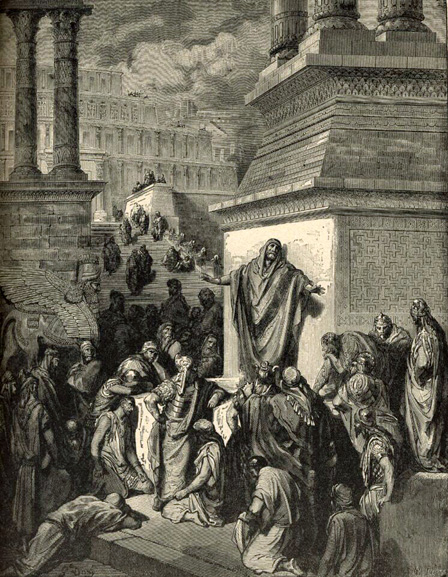
So Jonah arose, and went unto Nineveh, according to the word of the Lord. Now Nineveh was an exceeding great city of three days' journey. And Jonah began to enter into the city a day's journey and he cried, and said, yet forty days, and Nineveh shall be overthrown.
So the people of Nineveh believed God, and proclaimed a fast, and put on sackcloth, from the greatest of them even to the least of them. For word came unto the king of Nineveh and he arose from his throne and he laid his robe from him and covered him with sackcloth, and sat in ashes. And he caused it to be proclaimed and published through Nineveh by the decree of the king and his nobles, saying, Let neither man nor beast, herd nor flock taste anything: let them not feed, nor drink water: but let man and beast be covered with sackcloth, and cry mightily unto God: yea, let them turn everyone from his evil way, and from the violence that is in their hands. Who can tell if God will turn and repent, and turn away from his fierce anger that we perish not?
And God saw their works, that they turned from their evil way; and God repented of the evil, that he had said that he would do unto them; and he did it not.
Jonah iii
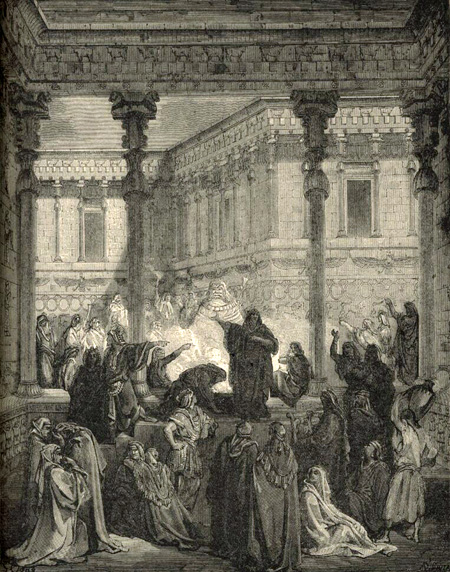
And the king being angry called for his priests, and said to them: If you tell me not, who it is that eats up these expenses, you shall die. But if you can show that Bel eats these things, Daniel shall die, because he hath blasphemed against Bel.
And Daniel said to the king: Be it done according to thy word.
Now the priests of Bel were seventy besides their wives and little ones and children. And they went with Daniel into the temple of Bel. And the priests of Bel said: Behold, we go out: and do thou, O king, set on the meats, and make ready, the wine, and shut the door fast, and seal it with thy own ring: and when thou come in the morning, if thou find not that Bel hath eaten all up, we will suffer death, or else Daniel that hath lied against us.
And they little regarded it, because they had made under the table a secret entrance, and they always came in by it, and consumed those things.
So it came to pass after they were gone out, the king set the meats before Bel: and Daniel commanded his servants, and they brought ashes, and he sifted them all over the temple before the king: and going forth they shut the door, and having sealed it with the king's ring, they departed.
But the priests went in by night, according to their custom, with their wives and their children: and they eat and drank all up.
And the king rose early in the morning and Daniel with him. And the king said: Are the seals whole, Daniel? And he answered: They are whole, O king. And as soon as he had opened the door, the king looked upon the table, and cried out with a loud voice Great art thou, O Bel, and there is not any deceit with thee. And Daniel laughed: and he held the king that he should not go in: and he said: Behold the pavement, mark whose footsteps these are. And the king said: I see the footsteps of men, and women, and children. And the king was angry. Then he took the priests, and their wives, and their children: and they showed him the private doors by which they came in, and consumed the things that were on the table.
The king therefore put them to death, and delivered Bel into the power of Daniel: who destroyed him, and his temple.
Daniel xiv, 1-21
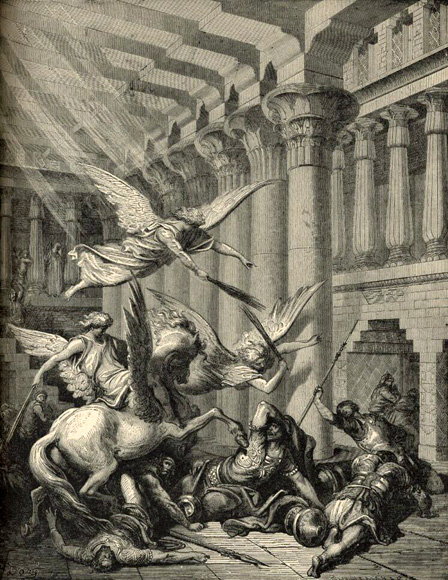
But the spirit of the Almighty God gave a great evidence of his presence, so that all that had presumed to obey him, falling down by the power of God, were struck with fainting and dread. For there appeared to them a horse with a terrible rider upon him, adorned with a very rich covering: and he ran fiercely and struck Heliodorus with his fore-feet, and he that sat upon him seemed to have armor of gold. Moreover, there appeared two other young men, beautiful and strong, bright and glorious, and in comely apparel: who stood by him, on either side, and scourged him without ceasing with many stripes.
And Heliodorus suddenly fell to the ground, and they took him up covered with great darkness, and having put him into a litter they carried him out. So he that came with many servants, and all his guard into the aforesaid treasury, was carried out, no one being able to help him, the manifest power of God being known. And he indeed by the power of God lay speechless, and without all hope of recovery.
2 Maccabees iii, 23-29
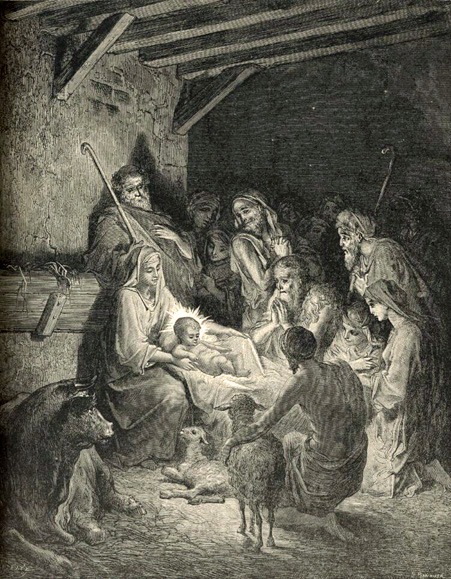
And Joseph also went up from Galilee, out of the city of Nazareth, into Judaea, unto the city of David, which is called Bethlehem; because he was of the house and lineage of David: to be taxed with Mary, his espoused wife, being great with child. And so it was, that, while they were there, the days were accomplished that she should be delivered. And she brought forth her firstborn son, and wrapped him in swaddling clothes, and laid him in a manger; because there was no room for them in the inn.
And there were in the same country shepherds abiding in the field, keeping watch over their flock by night. And, lo, the angel of the Lord came upon them, and the glory of the Lord shone round about them: and they were sore afraid: And the angel said unto them, Fear not: for, behold, I bring you good tidings of great joy, which shall be to all people. For unto you is born this day in the city of David a Savior, which is Christ the Lord. And this shall be a sign unto you; Ye shall find the babe wrapped in swaddling clothes, lying in a manger. And suddenly there was with the angel a multitude of the heavenly host praising God, and saying, Glory to God in the highest, and on earth peace, good will toward men.
And it came to pass, as the angels were gone away from them into heaven, the shepherds said one to another, Let us now go even unto Bethlehem, and see this thing which is come to pass, which the Lord hath made known unto us. And they came with haste, and found Mary, and Joseph, and the babe lying in a manger. And when they had seen it, they made known abroad the saying which was told them concerning this child. And all they that heard it, wondered at those things which were told them by the shepherds. But Mary kept all these things, and pondered them in her heart. And the shepherds returned, glorifying and praising God for all the things that they had heard and seen, as it was told unto them.
And when eight days were accomplished for the circumcising of the child, his name was called Jesus, which was so named of the angel before he was conceived in the womb.
Luke ii
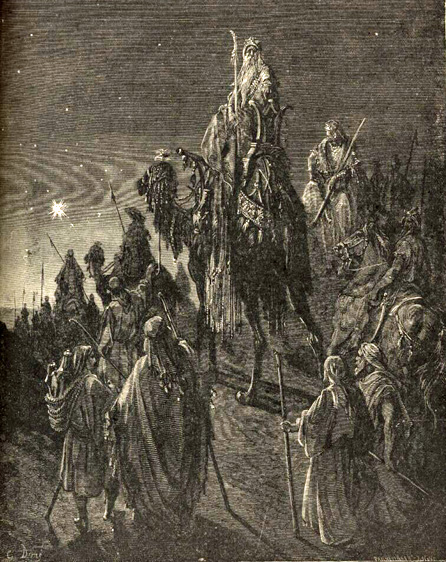
When Herod the king had heard these things, he was troubled, and all Jerusalem with him. And when he had gathered all the chief priests and scribes of the people together, he demanded of them where Christ should be born. And they said unto him; In Bethlehem of Judaea: for thus it is written by the prophet, and thou Bethlehem! In the land of Juda, is not the least among the princes of Juda: for out of the shall come a Governor, that shall rule my people Israel.
Then Herod, when he had privately called the wise men, enquired of them diligently, what time the star appeared. And he sent them to Bethlehem, and said, Go and search diligently for the young child; and when ye have found him, bring me word again, that I may come and worship him also. When they had heard the king, they parted; and, lo, the star, which they saw in the east, went before them, till it came and stood over where the young child was. When they saw the star, they rejoiced with exceeding great joy.
Matthew ii, 1-10
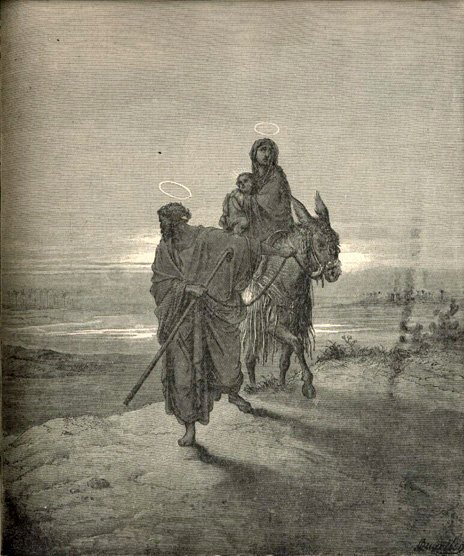
When he arose, he took the young child and his mother by night, and departed into Egypt: and was there until the death of Herod: that it might be fulfilled which was spoken of the Lord by the prophet, saying, Out of Egypt have I called my son.
Matthew ii 13-15
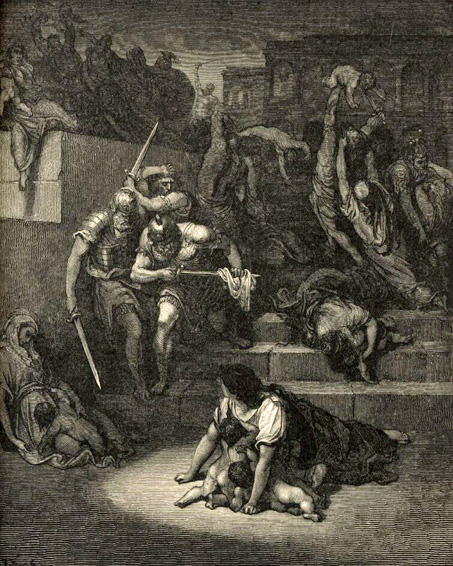
Then was fulfilled that which was spoken by Jeremy the prophet, saying, In Rama was there a voice heard, lamentation, and weeping, and great mourning, Rachel weeping for her children, and would not be comforted, because they are not.
Matthew ii, 16-18
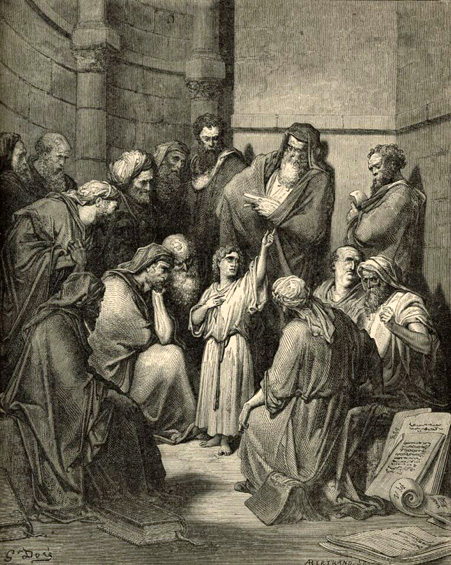
And when he was twelve years old, they went up to Jerusalem after the custom of the feast. And when they had fulfilled the days, as they returned, the child Jesus tarried behind in Jerusalem; and Joseph and his mother, knew not of it. But they, supposing him to have been in the company, went a day's journey and they sought him among their kinsfolk and acquaintance. And when they found him not, they turned back again to Jerusalem, seeking him.
And it came to pass, that after three days they found him in the temple, sitting in the midst of the doctors, both hearing them, and asking them questions. And all that heard him were astonished at his understanding and answers.
And when they saw him, they were amazed: and his mother said unto him, Son, why hast thou thus dealt with us? Behold, thy father and I have sought thee sorrowing. And he said unto them, How is it that, ye sought me? Whilst ye not that I must be about my father's business? And they understood not the saying which he spoke unto them.
And he went down with them, and came to Nazareth, and was subject unto them but his mother kept all these sayings in her heart.
And Jesus increased in wisdom and stature, and in favor with God and man.
Luke ii, 41-52
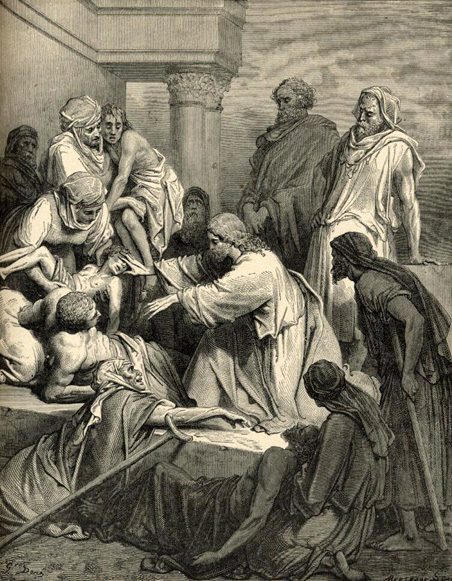
Matthew iv, 23-24
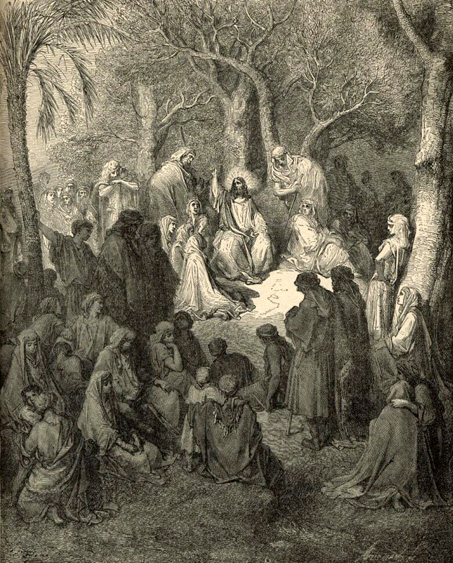
And seeing the multitudes, he went up into a mountain: and when he was set, his disciples came unto him. And he opened his mouth and taught them.
And it came to pass, when Jesus had ended these sayings, the people were astonished at his doctrine: For he taught them as one having authority, and not as the scribes.
When he was come down from the mountain, great multitudes followed him.
Matthew iv, 25; v, 1-2, 28-29, viii, 1
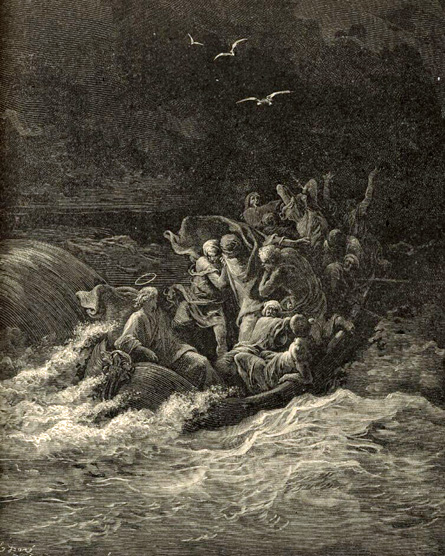
Matthew viii, 23-27
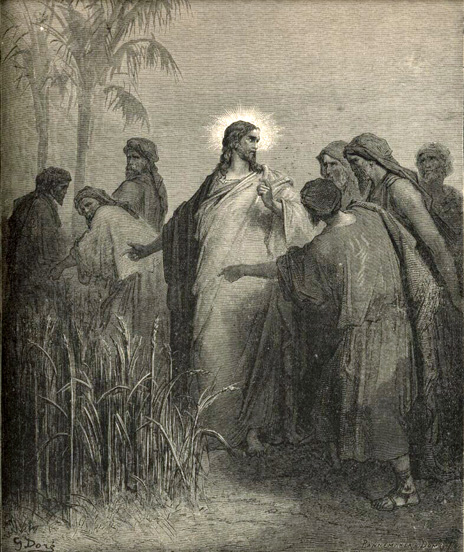
And the Pharisees said unto him, Behold, why do they on the Sabbath day that which is not lawful?
And he said unto them, have ye never read what David did, when he had need, and was a hungered, he, and they that were with him? How he went into the house of God in the days of Abiathar the high priest, and did eat the shewbread, which is not lawful to eat but for the priests, and gave also to them which were with him? And he said unto them, The Sabbath was made for man, and not man for the Sabbath: Therefore the Son of man is Lord also of the Sabbath.
Mark ii, 23-28
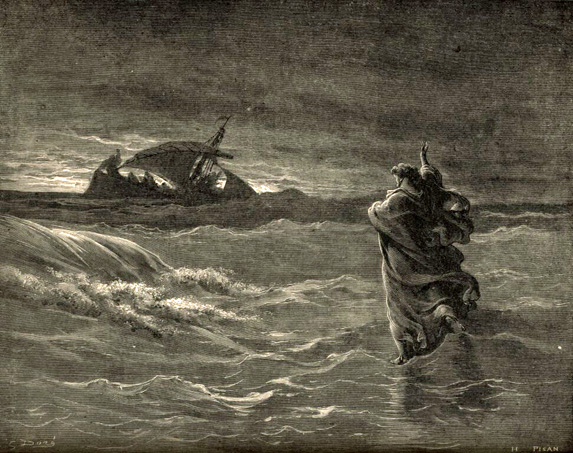
And he went up unto them into the ship; and the wind ceased: and they were sore amazed in themselves beyond measure, and wondered. For they considered not the miracle of the loaves; for their heart was hardened.
Mark vi, 46-52
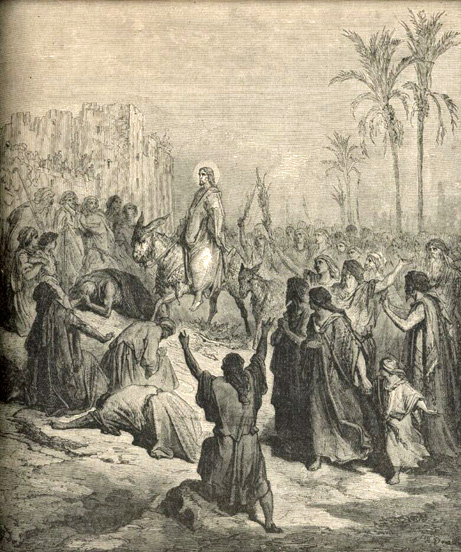
All this was done that it might be fulfilled which was spoken by the prophet, saying, Tell ye the daughter of Sion, Behold, thy King cometh unto thee, meek, and sitting upon an ass'; and a colt the foal of an ass.
And the disciples went, and did as Jesus commanded them, and brought the ass, and the colt, and put on them their clothes, and they set him thereon.
And a very great multitude spread their garments in the way; others cut down branches; from the trees, and strewed them in the way. And the multitudes that went before, and that followed, cried, saying, Hosanna to the son of David: Blessed is he that cometh in the name of the Lord; Hosanna in the highest.
And when he was come into Jerusalem, all the city was moved, saying, Who is this? And the multitude said, This is Jesus the prophet of Nazareth of Galilee.
Matthew xxi, 1-2
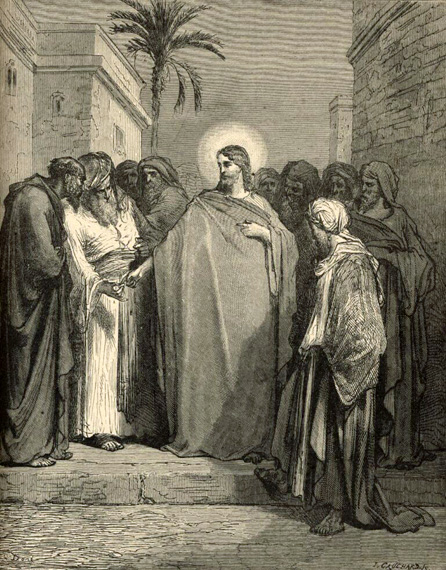
And when they were come, they say unto him, Master, we know that thou art true, and care for no man: for thou regard not the person of men, but teach the way of God in truth: Is it lawful to give tribute to Caesar, or not? Shall we give, or shall we not give?
But he, knowing their hypocrisy, said unto them, Why tempt ye me? Bring me a penny, that I may see it. And they brought it.
And he said unto them, Whose is this image and superscription? And they said unto him, Caesar's.
And Jesus answering said unto them, Render to Caesar the things that are Caesar's, and to God the things that are God's.
And they marveled at him.
Mark xii, 13-17
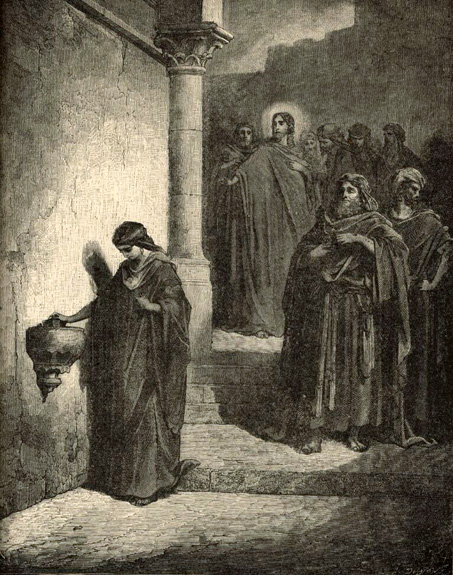
And there came a certain poor widow, and she threw in two mites, which make a farthing. And he called unto him his disciples, and said unto them, Verily I say unto you, That this poor widow hath cast more in, than all they which have cast into the treasury: for all they did cast in of their abundance; but she of her want did cast in all that she had, even all her living.
Mark xii, 13-17
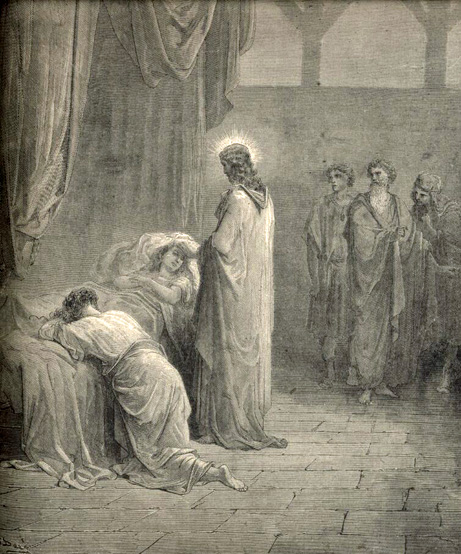
And a certain woman which had an issue of blood twelve years, and had suffered many things of many physicians, and had spent all that she had, and was nothing bettered, but rather grew, worse, when she had heard of Jesus, came in the press behind, and touched his garment. For she said, if I may touch but his clothes, I shall be whole. And straightway the fountain of her blood was dried up; and she felt in her body that she was healed of that plague. And Jesus, immediately knowing in himself that virtue had gone out of him, turned him about in the press, and said, Who touched my clothes? And his disciples said unto him, Thou seethe multitude thronging thee, and say thou, Who touched me? And he looked round about to see her that had done this thing. But the woman fearing and trembling, knowing what was done in her, came and fell down before him, and told him all the truth. And he said unto her Daughter, thy faith hath made the whole; go in peace, and be whole of thy plague.
While he yet spoke, there came from the ruler of the synagogue's house certain which said, Thy daughter is dead: why trouble thou the Master any further? As soon as Jesus heard the word that was spoken, he said unto the ruler of the synagogue, Be not afraid, only believe. And he suffered no man to follow him, save Peter, and James, and John the brother of James. And he comes to the house of the ruler of the synagogue, and sees the tumult, and them that wept and wailed greatly. And when he was come in, he said unto them, Why make ye this ado, and weep? The damsel is not dead, but sleeps. And they laughed him to scorn. But when he had put them all out, he takes the father and the mother of the damsel, and them that were with him, and enters in where the damsel was lying. And he took the damsel by the hand, and said unto her, Talitha cumi; which is, being interpreted, Damsel, I say unto thee, arise. And straightway the damsel arose, and walked; for she was of the age of twelve years. And they were astonished with a great astonishment.
And he charged them straitly that no man should know it; and commanded that something should be given her to eat.
Mark v, 22-43
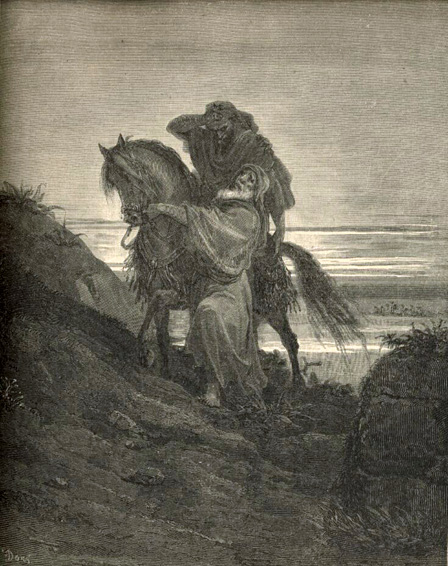
And Jesus answering said, A certain man went down from Jerusalem to Jericho, and fell among thieves, which stripped him of his raiment, and wounded him, and departed, leaving him half dead. And by chance there came down a certain priest that way: and when he saw him, he passed by on the other side. And likewise a Levite, when he was at the place, came and looked on him, and passed by on the other side. But a certain Samaritan, as he journeyed, came where he was: and when he saw him, he had compassion on him. And went to him, and bound up his wounds, pouring in oil and wine, and set him on his own beast, and brought him to an inn, and took care of him. And on the morrow when he departed, he took out two pence, and gave them to the host, and said unto him, Take care of him; and whatsoever thou spend more, when I come again, I will repay thee. Which now of these three, think thou, was neighbor unto him that fell among the thieves?
And he said, He that showed mercy on him.
Then said Jesus unto him, Go, and do thou likewise.
Luke x, 29-37
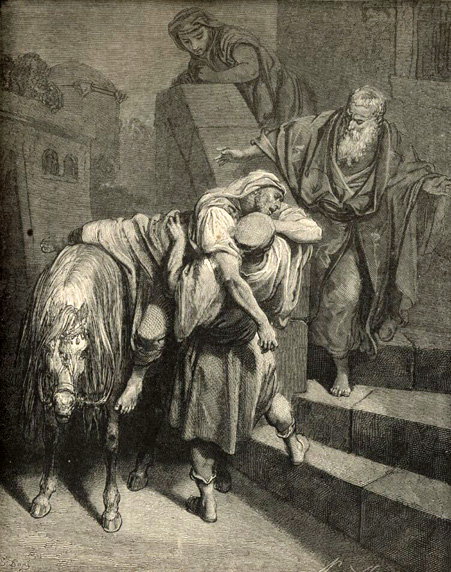
Luke x, 33-34
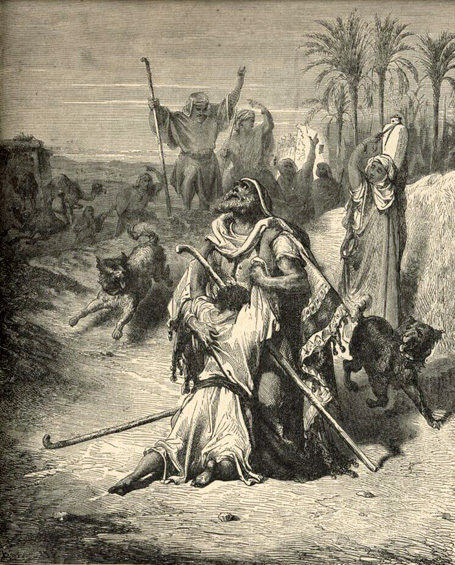
And he said a certain man had two sons: and the younger of them said to his father, Father, give me the portion of goods that falls to me. And he divided unto them his living.
And not many days after the younger son gathered all together, and took his journey into a far country, and there wasted his substance with riotous living. And when he had spent all, there arose a mighty famine in that land; and he began to be in want. And he went and joined himself to a citizen of that country; and he sent him into his fields to feed swine. And he would fain have filled his belly with the husks that the swine did eat: and no man gave unto him.
And when he came to himself, he said, How many hired servants of my father's have bread enough and to spare, and I perish with hunger! I will arise and go to my father, and will say unto him, Father, I have sinned against heaven, and before thee, and am no more worthy to be called thy son: make me as one of thy hired servants.
And he arose, and came to his father. But when he was yet a great way off, his father saw him, and had compassion, and ran, and fell on his neck, and kissed him. And the son said unto him, Father, I have sinned against heaven, and in thy sight, and am no more worthy to be called thy son. But the father said to his servants, Bring forth the best robe, and put it on him; and put a ring on his hand, and shoes on his feet: And bring hither the fatted calf, and kill it; and let us eat, and be merry: for this my son was dead, and is alive again; he was lost, and is found. And they began to be merry.
Now his elder son was in the field: and as he came and drew nigh to the house, he heard music and dancing. And he called one of the servants, and asked what these things meant.
And he said unto him, thy brother is come; and thy father hath killed the fatted calf, because he hath received him safe and sound.
And he was angry, and would not go in: therefore came his father out, and entreated him. And he answering said to his father, Lo, these many years do I serve thee, neither transgressed I at any time thy commandment: and yet thou never gave me a kid, that I might make merry with my friends: but as soon as this thy son was come, which hath devoured thy living with harlots, thou hast killed for him the fatted calf.
And he said unto him, Son, thou art ever with me, and all that I have is thine. It was meet that we should make merry, and be glad: for this thy brother was dead, and is alive again; and was lost, and is found.
Luke xv, 10-32
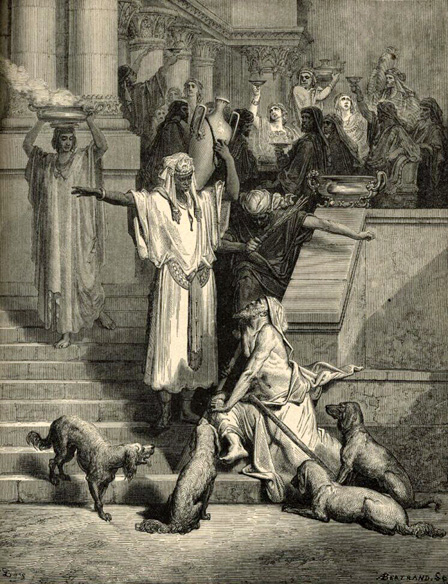
And there was a certain beggar named Lazarus, which was laid at his gate, full of sores, and desiring to be fed with the crumbs which fell from the rich man's table: moreover the dogs came and licked his sores.
And it came to pass, that the beggar died, and was carried by the angels into Abraham's bosom: the rich man also died, and was buried; and in hell he lifted up his eyes, being in torments, and saw Abraham afar off, and Lazarus in his bosom. And he cried and said, Father Abraham, have mercy on me, and send Lazarus, that he may dip the tip of his finger in water and cool my tongue; for I am tormented in this flame.
But Abraham said, Son, remember that thou in thy lifetime received thy good things, and likewise Lazarus evil things: but now he is comforted, and thou art tormented. And beside all this, between us and you there is a great gulf fixed: so that they which would pass from hence to you cannot; neither can they pass to us, that would come from thence.
Then he said, I pray thee therefore, father, that thou would send him to my father's house: for I have five brethren; that he may testify unto them, lest they also come into this place of torment.
Abraham said unto him, They have Moses and the prophets; let them hear them.
And he said, Nay, father Abraham: but if one went unto them from the dead, they will repent.
And he said unto him, If they hear not Moses and the prophets, neither will they be persuaded though one rose from the dead.
Luke xvi, 19-31
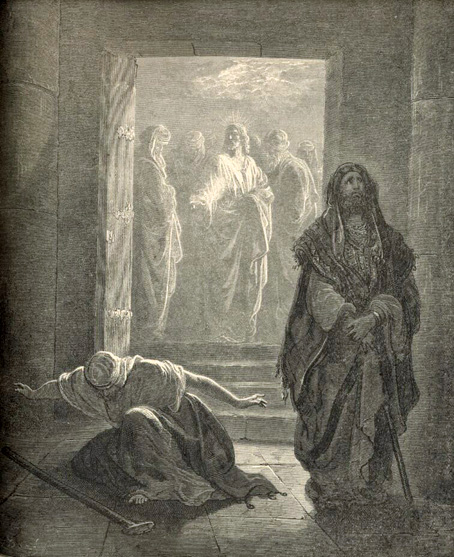
Two men went up into the temple to pray; the one a Pharisee, and the other a publican; The Pharisee stood and prayed thus with himself, God, I thank thee, that I am not as other men are, extortioners, unjust, adulterers, or even as this publican. I fast twice in the week; I give tithes of all that I possess. And the publican, standing afar off, would not lift up as much as his eyes unto heaven, but smote upon his breast, saying, God be merciful to me a sinner. I tell you, this man went down to his house justified rather than the other: for every: one that exalts himself shall be abased; and he that humbles himself shall be exalted.
Luke xviii, 9-14

(For his disciples were gone away unto the city to buy meat.)
Then said the woman of Samaria unto him, How is it that thou, being a Jew, ask drink of me, which am a woman of Samaria? For the Jews have no dealings with the Samaritans.
Jesus answered and said unto her, If thou knew the gift of God, and who it is that said to thee, Give me to drink; thou would have asked of him, and he would have given thee living water.
The woman said unto him, Sir, thou hast nothing to draw with, and the well is deep from whence then hast thou that living water? Art thou greater than our father Jacob, which gave us the well, and drank thereof himself, and his children, and his cattle?
Jesus answered and said unto her, Whosoever drinks of this water shall thirst again but whosoever drinks of the water that I shall give him shall never thirst; but the water that I shall give him shall be in him a well of water springing up into everlasting life.
The woman said unto him, Sir, give me this water, that I thirst not, neither come hither to draw.
Jesus said unto her, Go, call thy husband, and come hither. The woman answered and said, I have no husband.
Jesus said unto her, Thou hast well said, I have no husband: for thou hast had five husbands; and he whom thou now hast is not thy husband: in that said thou truly.
The woman said unto him, Sir, I perceive that thou art a prophet. Our fathers worshiped in this mountain; and ye say, that in Jerusalem is the place where men ought to worship.
Jesus said unto her, Woman, believe me, the hour cometh, when ye shall neither in this mountain, nor yet at Jerusalem, worship the Father. Ye worship ye know not what: we know what we worship; for salvation is of the Jews. But the hour comes, and now is, when the true worshipers shall worship the Father in spirit and in truth: for the Father seeks such to worship him. God is a Spirit: and they that worship him must worship him in spirit and in truth.
The woman said unto him, I know that Messias cometh, which is called Christ: when he is come, he will tell us all things.
Jesus said unto her, I that speak unto thee am he.
And upon this came his disciples, and marveled that he talked with the woman: yet no man said, What seek thou? or, Why talk thou with her?
The woman then left her water pot, and went her way into the city, and said to the men, Come, see a man, which told me all things, that ever I did: is not this the Christ? Then they went out of the city, and came unto him.
John iv, 5-30
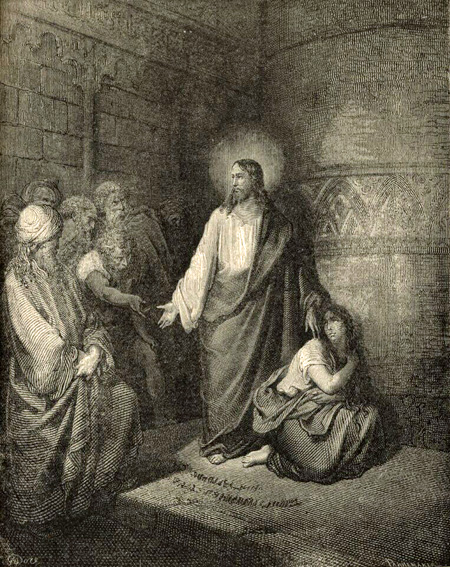
And the scribes and Pharisees brought unto him a woman taken in adultery; and when they had set her in the midst, they say unto him, Master, this woman was taken in adultery, in the very act. Now Moses in the law commanded us, that such should be stoned: but what says thou? This they said, tempting him, that they might have to accuse him.
But Jesus stooped down, and with his finger wrote on the ground, as though he heard them not.
So when they continued asking him, he lifted up himself, and said unto them, He that is without sin among you, let him first cast a stone at her.
And again he stooped down, and wrote on the ground.
And they which heard it, being convicted by their own conscience, went out one by one, beginning at the eldest, even unto the last; and Jesus was left alone, and the woman standing in the midst. When Jesus had lifted up himself, and saw none but the woman, he said unto her, Woman where are those thine accusers? Hath no man condemned thee? She said, No man, Lord.
And Jesus said unto her, Neither do I condemn thee: go, and sin no more.
John viii, 1-11
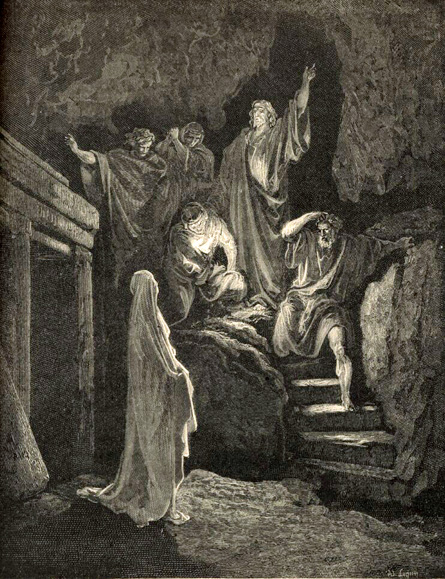
When Jesus therefore saw her weeping, and the Jews also weeping which came with her, he groaned in the spirit, and was troubled, and said, Where have ye laid him?
They said unto him, Lord, come and see.
Jesus wept.
Then said the Jews, Behold how he loved him! And some of them said, Could not this man, which opened the eyes of the blind, have caused that even this man should not have died?
Jesus therefore again groaning in himself cometh to the grave. It was a cave and a stone lay upon it. Jesus said, Take ye away the stone.
Martha, the sister of him that was dead, said unto him, Lord, by this time he stinks for he hath been dead four days.
Jesus said unto her, Said I not unto thee, that, if thou would believe, thou should see the glory of God?
Then they took away the stone from the place where the dead was laid.
And Jesus lifted up his eyes, and said, Father, I thank thee that thou hast heard me. And I knew that thou heard me always: but because of the people which standby I said it, that they may believe that thou hast sent me.
And when he thus had spoken, he cried with a loud voice, Lazarus, come forth.
And he that was dead came forth, bound hand and foot with grave clothes: and his face was bound about with a napkin.
Jesus said unto them, Loose him, and let him go.
Then many of the Jews which came to Mary, and had seen the things which Jesus did, believed on him.
John xi, 30-45
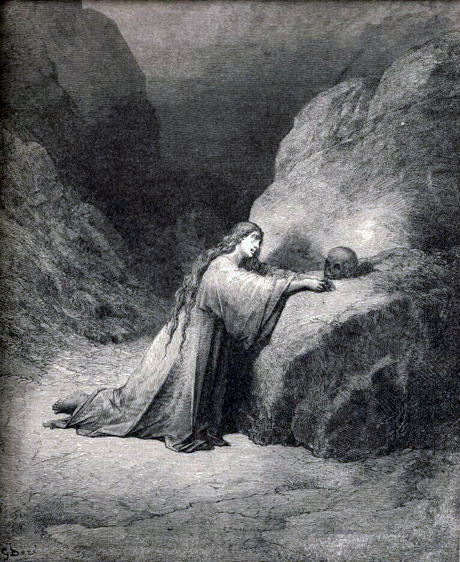
Of Mary "called Magdalene" but few particulars are recorded in scripture. We first hear of her as having been delivered by Jesus of seven devils. Impelled, no doubt, by gratitude for her deliverance, she becomes one of his followers, accompanying him thence forward in all his wanderings faithfully till his death. She was the first person to whom he appeared after his resurrection. The common belief that she was a fallen woman is destitute of the slightest foundation. On the contrary, the references to her as being in the company of such women as Joanna, the wife of Herod's steward, Salome, the mother of James and John, and Mary, the mother of Jesus; strongly discountenance such a supposition. The error, which had no other source than ecclesiastical tradition, has been fostered and perpetuated by the stupid blunder of the translators of the Authorized Version in identifying her with the "sinner" who is described in Luke vii, 37-50 as washing the feet of Jesus with her tears.
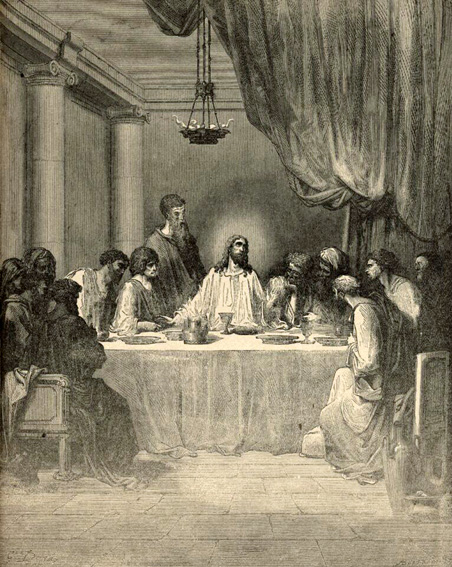
Now when evening was come, he sat down with the twelve. And as they did eat, he said, Verily I say unto you, that one of you shall betray me.
And they were exceeding sorrowful, and began every one of them to say unto him, Lord, is it I?
And he answered and said He that dips his hand with me in the dish the same shall betray me. The Son of man goes as it is written of him: but woe unto that man by whom the Son of man is betrayed! It had been good for that man if he had not been born. Then Judas, who betrayed him, answered and said, Master, is it I? He said unto him, Thou hast said.
And as they were eating, Jesus took bread, and blessed it, and broke it, and gave it to the disciples, and said, Take, eat; this is my body. And he took the cup, and gave thanks, and gave it to them, saying, Drink ye all of it; for this is my blood of the new testament, which is shed for many for the remission of sins. But I say unto you, I will not drink henceforth of this fruit of the vine, until that day when I drink it new with you in my Father's kingdom.
And when they had sung an hymn, they went out into the mount of Olives.
Matthew xxvi, 17-30
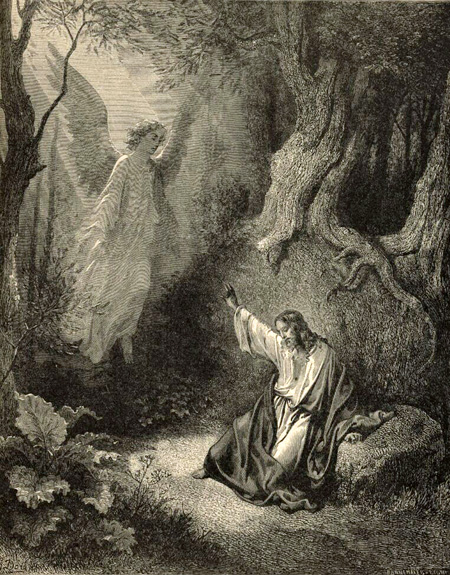
And he was withdrawn from them about a stone's cast, and kneeled down, and prayed Saying, Father, if thou be willing, remove this cup from me: nevertheless not my will, but thine, be done.
And there appeared an angel unto him from heaven, strengthening him.
And being in an agony he prayed more earnestly: and his sweat was as it were great drops of blood falling down to the ground.
And when he rose up from prayer, and was come to his disciples, he found them sleeping for sorrow, and said unto them, Why sleep ye? Rise and pray, lest ye enter into temptation
Luke xxii, 39-46
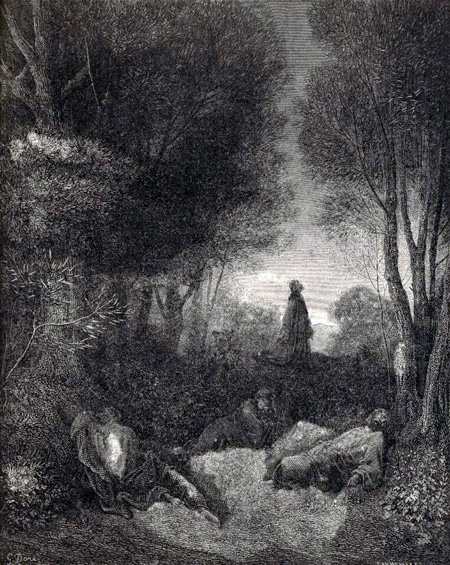
And he went a little farther, and fell on his face, and prayed, saying, O my Father, if be possible, let this cup pass from me: nevertheless not as I will, but as thou wilt.
And he comes unto the disciples, and finds them asleep, and said unto Peter, What, could ye not watch with me one hour? Watch and pray, that ye enter not into temptation the spirit indeed is willing, but the flesh is weak.
He went away again the second time, and prayed, saying, O my Father, if this cup may not pass away from me, except I drink it, thy will be done.
And he came and found them asleep again: for their eyes were heavy.
And he left them, and went away again, and prayed the third time, saying the same words.
Then comes he to his disciples, and said unto them, Sleep on now, and take your rest behold, the hour is at hand, and the Son of man is betrayed into the hands of sinners. Rise let us be going: behold, he is at hand that doth betray me.
Matthew xxvi, 36-46
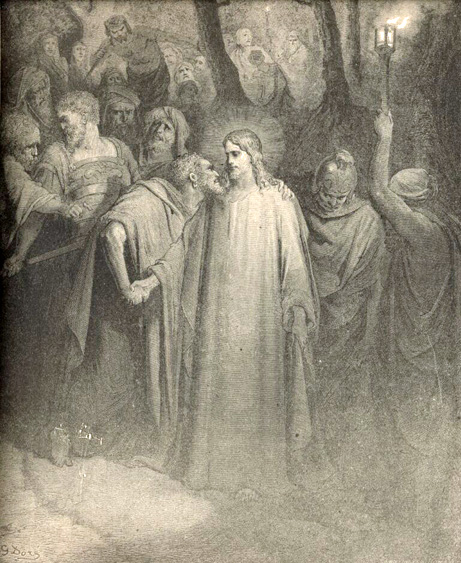
And immediately, while he yet spoke, comes Judas, one of the twelve, and with him great multitude with swords and staves, from the chief priests and the scribes and the elders. And he that betrayed him had given them a token, saying, Whomsoever I shall kiss, that same is he; take him, and lead him away safely. And as soon as he had arrived, he went straight way to him, and said, Master, master; and kissed him.
And they laid their hands on him, and took him. And one of them that stood by drew a sword, and smote a servant of the high priest, and cut off his ear. And Jesus answered and said unto them, Are ye come out, as against a thief, with swords and with staves to take me? I was daily with you in the temple teaching, and ye took me not but the scriptures must be fulfilled.
And they all forsook him, and fled.
Mark xiv, 41-50
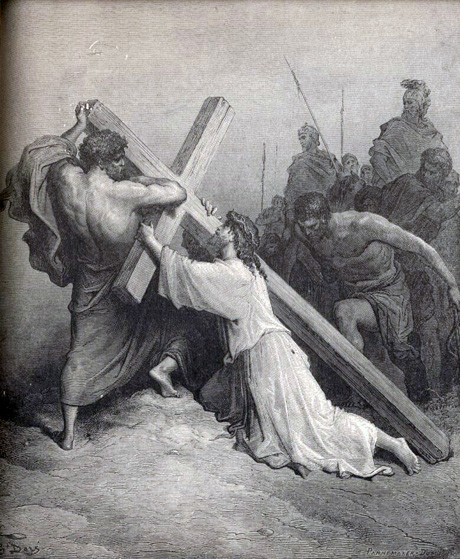
John xix, 16-18
In not one of the four narratives is there so much as a hint that he fainted under the burden.
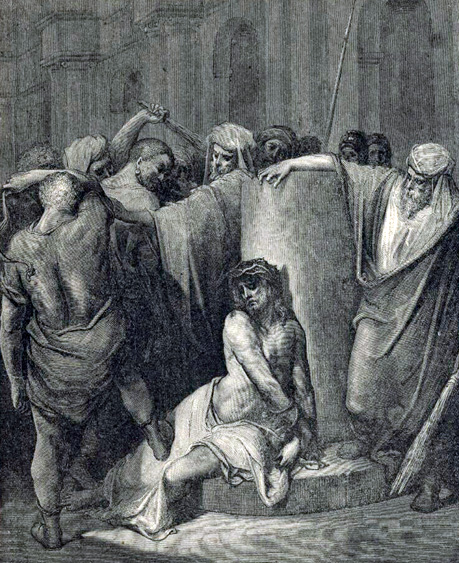
Matthew xxvii, 26
And so Pilate, willing to content the people, released Barabbas unto them, and deliver Jesus, when he had scourged him, to be crucified.
Mark xv, 15
Then Pilate therefore took Jesus, and scourged him.
John xix
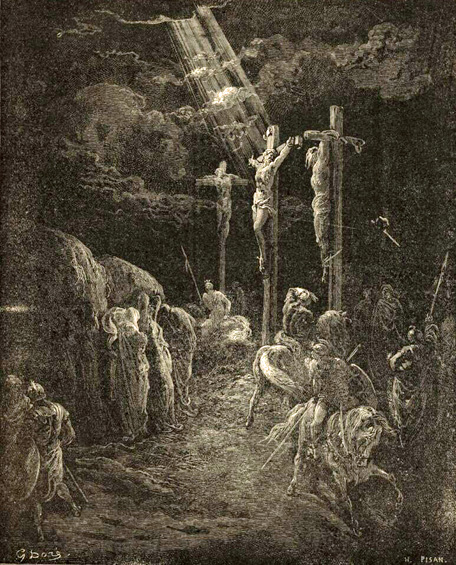
Then were there two thieves crucified with him, one on the right hand, and another on the left.
And they that passed by reviled him, wagging their heads, and saying, Thou that destroyed the temple, and built it in three days, save thyself. If thou be the Son of God come down from the cross.
Likewise also the chief priests mocking him, with the scribes and elders, said, He saved others: himself he cannot save. If he be the King of Israel, let him now come down from the cross, and we will believe him. He trusted in God; let him deliver him now, if he will have him: for he said, I am the Son of God.
The thieves also, which were crucified with him, cast the same in his teeth.
Matthew xxvii, 33 - 44
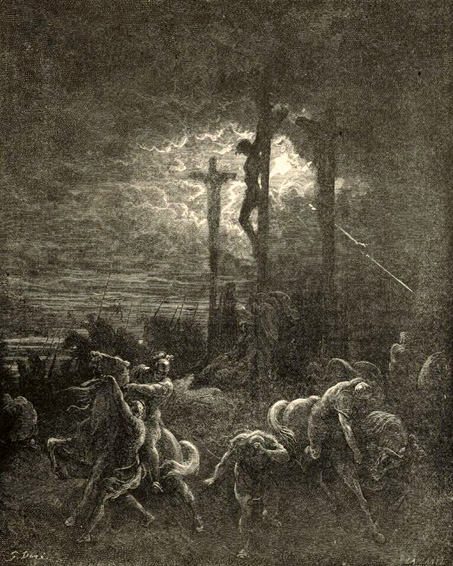
Some of them that stood there, when they heard that, said, this man calls for Elias. And straightway one of them ran, and took a sponge, and filled it with vinegar, and put it on a reed, and gave him to drink. The rest said, Let be, let us see whether Elias will come to save him.
Jesus, when he had cried again with a loud voice, yielded up the ghost.
And, behold, the veil of the temple was rent in twain from the top to the bottom; and the earth did quake, and the rocks rent; and the graves were opened; and many bodies of the saints which slept arose, and came out of the graves after his resurrection, and went into the holy city, and appeared unto many.
Now when the centurion, and they that were with him, watching Jesus, saw the earthquake, and those things that were done, they feared greatly, saying, truly this was the Son of God.
And many women were there beholding afar off, which followed Jesus from Galilee, ministering unto him: among which was Mary Magdalene, and Mary the mother of James and John, and the mother of Zebedee's children.
Matthew xxvii, 45-56
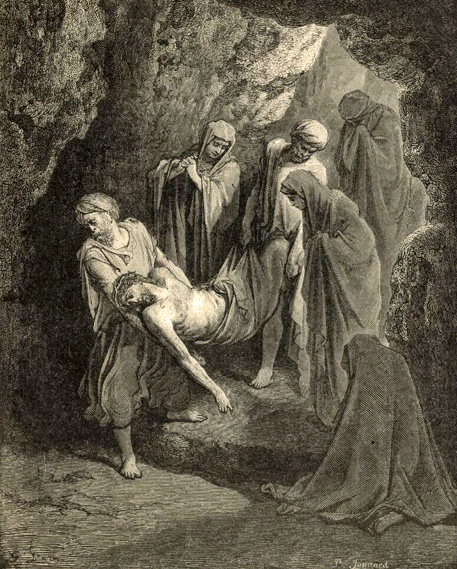
And there was Mary Magdalene, and the other Mary, sitting over against the sepulcher.
Matthew xxvii, 57-61
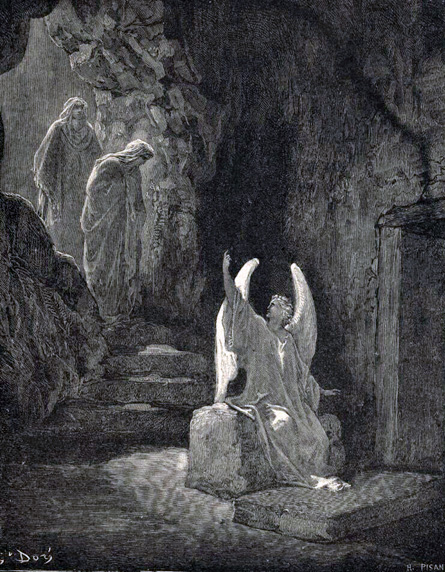
And, behold, there was a great earthquake: for the angel of the Lord descended from, heaven, and came and rolled back the stone from the door, and sat upon it. His countenance was like lightning, and his raiment white as snow: and for fear of him the keepers did shake, and became as dead men.
And the angel answered and said unto the women, Fear not ye: for I know that ye seek Jesus, which was crucified. He is not here: for he is risen, as he said. Come, see the place where the Lord lay. And go quickly, and tell his disciples that he is risen from the dead and, behold, he goes before you into Galilee; there shall ye see him: lo, I have told you.
And they departed quickly from the sepulcher with fear and great joy; and did run to bring his disciples word.
Matthew xxviii, 1-8
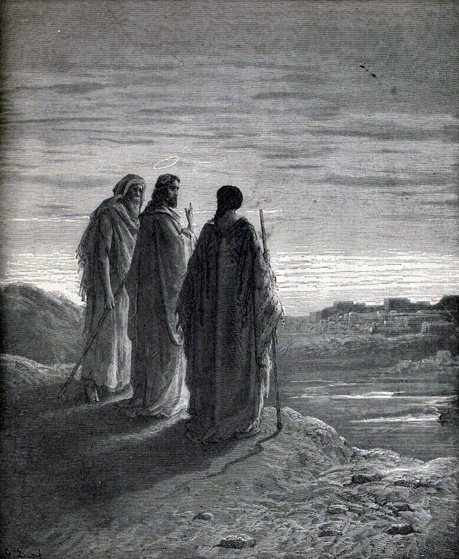
And they talked together of all these things which had happened. And it came to pass that, while they communed together and reasoned, Jesus himself drew near and went with them. But their eyes were holden that they should not know him.
And he said unto them, What manner of communications are these that ye have one to another, as ye walk, and are sad?
And the one of them, whose, name was Cleopas, answering said unto him, Art thou only a stranger in Jerusalem, and hast not known the things which are come to pass there in these days?
And he said unto them, What things?
And they said unto him, Concerning Jesus of Nazareth, which was a prophet mighty in deed and word before God and all the people: And how the chief priests and our rulers delivered him to be condemned to death, and have crucified him. But we trusted that it had been he which should have redeemed Israel: and beside all this, today is the third day since these things were done. Yea, and certain women also of our company made us astonished, which were early at the sepulcher; and when they found not his body, they came, saying, that they had also seen a vision of angels, which said that he was alive. And certain of them which were with us went to the sepulcher, and found it even so as the women had said: but him they saw not.
Then he said unto them, O fools, and slow of heart to believe all that the prophets have spoken: ought not Christ to have suffered these things, and to enter into his glory?
And beginning at Moses and all the prophets, he expounded unto them in all the scriptures the things concerning himself.
And they drew nigh unto the village, whither they went: and he made as though he would have gone further. But they constrained him, saying, Abide with us: for it is toward evening, and the day is far spent. And he went in to tarry with them.
And it came to pass, as he sat at meat with them, he took bread, and blessed it, and brake, and gave to them. And their eyes were opened, and they knew him; and he vanished out of their sight.
And they said one to another, Did not our heart burn within us, while he talked with us by the way, and while he opened to us the scriptures?
And they rose up the same hour, and returned to Jerusalem, and found the eleven gathered together, and them that were with them, saying, The Lord is risen indeed, and hath appeared to Simon.
And they told what things were done in the way, and how he was known of them in breaking of bread.
Luke xxiv, 13-35
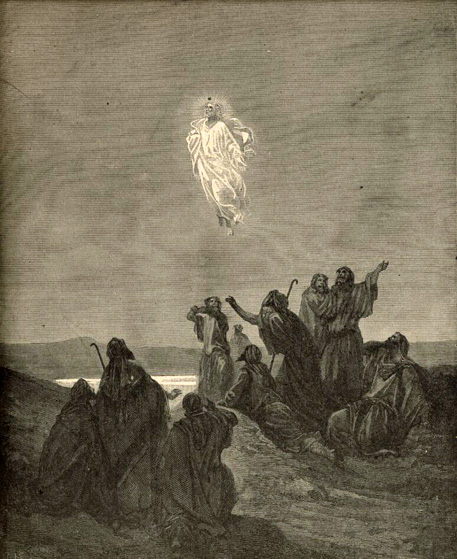
And they remembered his words. And returned from the sepulcher, and told all these things unto the eleven, and to all the rest.
And, behold, two of them went that same day to a village called Emmaus, which was from Jerusalem about threescore furlongs. And they talked together of all these things which had happened.
And they rose up the same hour, and returned to Jerusalem, and found the eleven gathered together, and them that were with them, saying, The Lord is risen indeed, and hath appeared to Simon. And they told what things were done in the way, and how he was known of them in breaking of bread. And as they thus spoke, Jesus himself stood in the midst of them, and said unto them, Peace be unto you.
And, behold, I send the promise of my Father upon you: but tarry ye in the city of Jerusalem, until ye be endued with power from on high.
And he led them out as far as to Bethany, and he lifted up his hands, and blessed them. And it came to pass, while he blessed them, he was parted from them, and carried up into heaven. And they worshiped him, and returned to Jerusalem with great joy
Luke xxiv, 1-2, 8-9, 13-14, 33-36, 49-52
The former treatise have I made, O Theophilus, of all that Jesus began both to do and teach, until the day in which he was taken up, after that he through the Holy Ghost had given commandments unto the apostles whom he had chosen: to whom also he showed himself alive after his passion by many infallible proofs, being seen of them forty days, and speaking of the things pertaining to the kingdom of God: and, being assembled together with them, commanded them that they should not depart from Jerusalem, but, wait for the promise of the Father, which, said he, ye have heard of me. For John truly baptized with water; but ye shall be baptized with the Holy Ghost not many days hence.
When they therefore were come together, they asked of him, saying, Lord, wilt thou at this time restore again the kingdom of Israel? And he said unto them, It is not for you to know the times or the seasons, which the Father hath put in his own power. But ye shall receive power, after that the Holy Ghost is come upon you: and ye shall be witnesses unto me both in Jerusalem, and all Judaea, and in Samaria, and unto the uttermost part of the earth.
And when he had spoken these things, while they beheld, he was taken up: and a cloud received him out of their sight. And while they looked steadfastly toward heaven as he went up, behold, two men stood by them in white apparel.
Acts i, 1-10
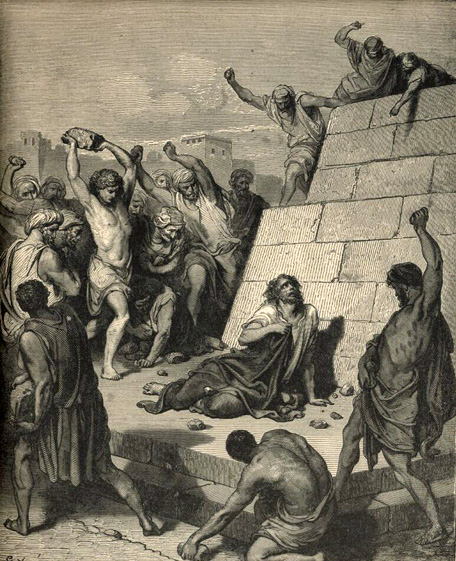
Then there arose certain of the synagogue, which is called the synagogue of the Libertines, and Cyrenians, and Alexandrians, and of them of Cilicia and of Asia, disputing with Stephen. And they were not able to resist the wisdom and the spirit by which he spoke. Then they suborned men, which said, we have heard him speak blasphemous words against Moses and against God. And they stirred up the people, and the elders, and the scribes, and came upon him, and caught him, and brought him to the council. And set up false witnesses, which said, This man ceased not to speak blasphemous words against this holy place, and the law: for we have heard him say, that this Jesus of Nazareth shall destroy this place, and shall change the customs which Moses delivered us.
And all that sat in the council, looking steadfastly on him, saw his face as it had been the face of an angel.
Then said the high priest, Are these things so?
And he said, Men, brethren, and fathers, hearken: Stephen here makes his defense, concluding with a terrible, denunciation of the Jews as being stiff-necked and persecutors of their prophets, and as betrayers and murderers of Jesus Christ.
When they heard these things, they were cut to the heart, and they, gnashed on him with their teeth.
But he, being full of the Holy Ghost, looked up steadfastly into heaven, and saw the glory of God, and Jesus standing on the right hand of God, and said, Behold, I see the heavens opened, and the Son of man standing on the right hand of God.
Then they cried out with a loud voice, and stopped their ears, and ran upon him with one accord, and cast him out of, the city, and stoned him: and the witnesses laid down their clothes at a young man's feet, whose name was Saul. And they stoned Stephen, calling upon God, and saying, Lord Jesus, receive my spirit.
And he kneeled down, and cried with a loud voice, Lord, lay not this sin to their charge. And when he had said this, he fell asleep.
And Saul was consenting unto his death.
Acts vi, 8-15; vii, 1-2, 54-56; viii, 1
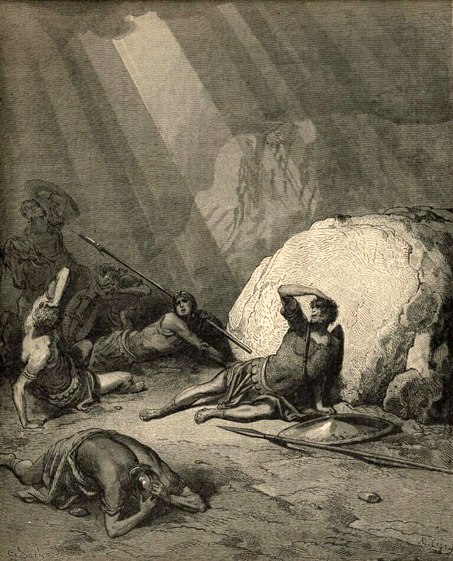
And as he journeyed, he came near Damascus: and suddenly there shined round about him a light from heaven: and he fell to the earth, and heard a voice, saying unto him, Saul, Saul, why persecute thou me? And he said, who art thou, Lord? And the Lord said, I am Jesus whom thou persecute it is hard for thee to kick against the pricks. And he trembling and astonished said, Lord, what wilt thou have me to do? And the Lord said unto him, Arise, and go into the city, and it shall be told thee what thou must do.
And the men who journeyed with him stood speechless, hearing a voice, but seeing no man.
And Saul arose from the earth; and when his eyes were opened, he saw no man: but they led him by the hand, and brought him into Damascus. And he was three days without sight, and neither did eat nor drink.
And there was a certain disciple at Damascus, named Ananias; and to him said the Lord in a vision, Ananias. And he said, Behold, I am here, Lord.
And the Lord said unto him, Arise, and go into the street which is called straight, and enquire in the house of Judas for one called Saul, of Tarsus: for, behold, he prays, and hath seen in a vision a man named Ananias coming in, and putting his hand on him, that he might receive his sight. Then Ananias answered, Lord, I have heard by many of this man, how much evil he hath done to thy saints at Jerusalem: and here he hath authority from the chief priests to bind all that call on thy name. But the Lord said unto him, Go thy way: for he is a chosen vessel unto me, to bear my name before the Gentiles, and kings, and the children of Israel: for I will show him how great things he must suffer for my name's sake.
And Ananias went his way, and entered into the house; and putting his hands on him said, Brother Saul, the Lord, even Jesus, that appeared unto thee in the way as thou came, has sent me, that thou might receive thy sight, and be filled with the Holy Ghost. And immediately there fell from his eyes as it had been scales: and he received sight forthwith, and arose and was baptized. And when he had received meat, he was strengthened.
Then was Saul certain days with the disciples which were at Damascus. And straightway he preached Christ in the synagogues, that he is the Son of God.
Acts ix, 1-20
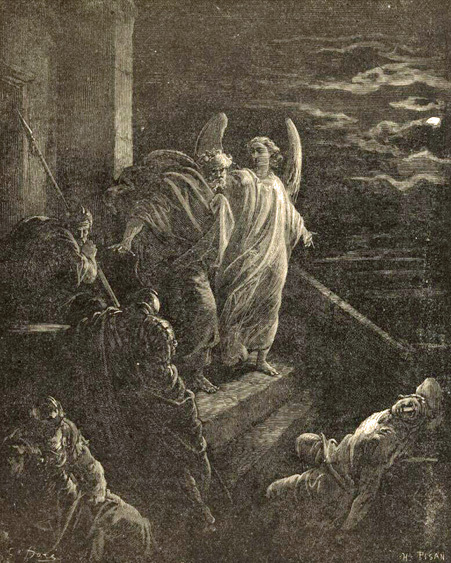
And because he saw it pleased the Jews, he proceeded further to take Peter also. (Then were the days of unleavened bread.) And when he had apprehended him, he put him in prison, and delivered him to four quarternions of soldiers to keep him; intending after Easter to bring him forth to the people.
Peter therefore was kept in prison: but prayer was made without ceasing of the church unto God for him.
And when Herod would have brought him forth, the same night Peter was sleeping between two soldiers, bound with two chains: and the keepers before the door kept the prison. And, behold, the angel of the Lord came upon him, and a light shined in the prison: and he smote Peter on the side, and raised him up, saying, Arise up quickly. And his chains fell off from his hands. And the angel said unto him, Gird thyself, and bind on thy sandals: And so he did. And he said unto him, Cast thy garment about thee, and follow me. And he went out, and followed him; and while not that it was true which was done by the angel but thought he saw a vision. When they were past the first and the second ward, they came unto the iron gate that leads unto the city; which opened to them of his own accord and they went out and passed on through one street and forthwith the angel departed from him.
And when Peter was come to himself, he said, Now I know of a surety, that the Lord hath sent his angel, and hath delivered me out of the hand of Herod, and from all the expectation of the people of the Jews.
Acts xii, 1-11
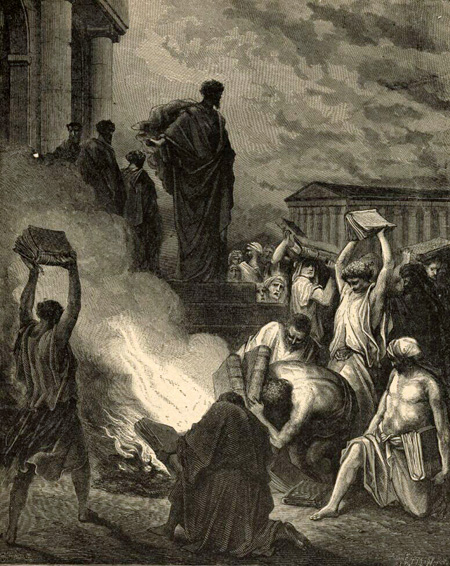
When they heard this, they were baptized in the name of the Lord Jesus. And when Paul had laid his hands upon them, the Holy Ghost came on them; and they spoke with tongues, and prophesied. And all the men were about twelve.
And he went into the synagogue and spoke boldly for the space of three months, disputing and persuading the things concerning the kingdom of God.
But when divers were hardened, and believed not, but spoke evil of that way before the multitude, he departed from them, and separated the disciples, disputing daily in the school of one Tyrannus. And this continued by the space of two years; so that all they which dwelt in Asia heard the word of the Lord Jesus, both Jews and Greeks.
And God wrought special miracles by the hands of Paul: so that from his body were brought unto the sick handkerchiefs or aprons, and the diseases departed from them, and the evil spirits went out of them.
Then certain of the vagabond Jews, exorcists, took upon them to call over them which had evil spirits the name of the Lord Jesus, saying, we adjure you by Jesus whom Paul preaches. And there were seven sons of one Sceva, a Jew, and chief of the priests, which did so. And the evil spirit answered and said, Jesus I know, and Paul I know; but who are ye? And the man in whom the evil spirit was leaped on them, and overcame them, and prevailed against them, so that they fled out of that house naked and wounded.
And this was known to all the Jews and Greeks also dwelling at Ephesus; and fear fell on them all, and the name of the Lord Jesus was magnified. And many that believed came, and confessed, and showed their deeds. Many of them also which used curious arts brought their books together, and burned them before all men: and they counted the price of them, and found it fifty thousand pieces of silver.
So mightily grew the word of God and prevailed.
Acts xix, 1 - 20
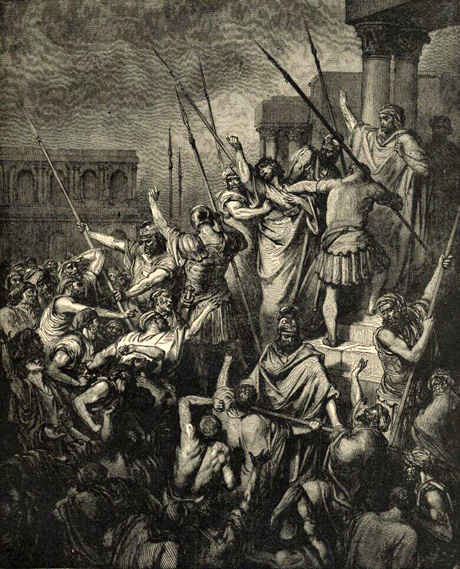
Then Paul took the men, and the next day purifying himself with them entered into the temple, to signify the accomplishment of the days of purification, until that an offering should be offered for every one of them.
And when the seven days were almost ended, the Jews which were of Asia, when they saw him in the temple, stirred up all the people, and laid hands on him, crying out, Men of Israel, help: this is the man, that teaches all men everywhere against the people, and the law, and this place: and further brought Greeks also into the temple, and hath polluted this holy place. (For they had seen before with him in the city Trophimus an Ephesian, whom they supposed that Paul had brought into the temple.)
And all the city was moved, and the people ran together: and they took Paul, and drew him out of the temple: and forthwith the doors were shut. And as they went about to kill him, tidings came unto the chief captain of the band, that all Jerusalem was in an uproar: who immediately took soldiers and centurions, and ran down unto them and when they saw the chief captain and the soldiers, they left beating of Paul. Then the chief captain came near, and took him, and commanded him to be bound with two chains; and demanded who he was, and what he had done. And some cried one thing, some another, among the multitude: and when he could not know the certainty for the tumult, he commanded him to be carried into the castle. And when he came upon the stairs, so it was, that he was borne of the soldiers for the violence of the people. For the multitude of the people followed after, crying, Away with him.
And as Paul was to be led into the castle, he said unto the chief captain, May I speak unto thee? Who said, Canst thou speak Greek? Art not thou that Egyptian, which before these days made an uproar, and led out into the wilderness four thousand men that were murderers? But Paul said I am a man which is a Jew of Tarsus, a city in Cilicia, a citizen of no mean city: and, I beseech thee, suffer me to speak unto the people.
And when he had given him license, Paul stood on the stairs, and beckoned with the hand unto the people. And when there was made a great silence, he spoke unto them in the Hebrew tongue.
Acts xxi, 23-40
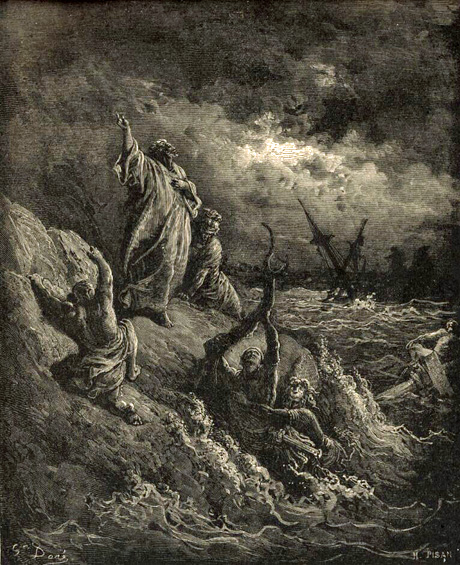
And when he had thus spoken, he took bread, and gave thanks to God in presence of them all; and when he had broken it, he began to eat. Then were they all of good cheer, and they also took some meat.
And we were in all in the ship two hundred threescore and sixteen souls.
And when they had eaten enough, they lightened the ship, and cast out the wheat into the sea. And when it was day, they knew not the land: but they discovered a certain creek with a shore, into which they were minded, if it were possible, to thrust in the ship. And when they had taken up the anchors, they committed themselves unto the sea, and loosed the rudder bands, and hoisted up the mainsail to the wind, and made toward shore. And falling into a place where two seas met, they ran the ship aground; and the forepart stuck fast, and remained unmovable, but the hinder part was broken with the violence of the waves. And the soldiers' counsel was to kill the prisoners, lest any of them should swim out, and escape. But the centurion, willing to save Paul, kept them from their purpose; and commanded that they which could swim should cast themselves first into the sea, and get to land: and the rest, some on boards, and some on broken pieces of the ship. And so it came to pass, that they escaped all safe to land.
And when they were escaped, then they knew that the island was called Melita.
And the barbarous people showed us no little kindness: for they kindled a fire, and received us every one, because of the present rain, and because of the cold.
Acts xxvii, 33-44; xxviii, 1-2
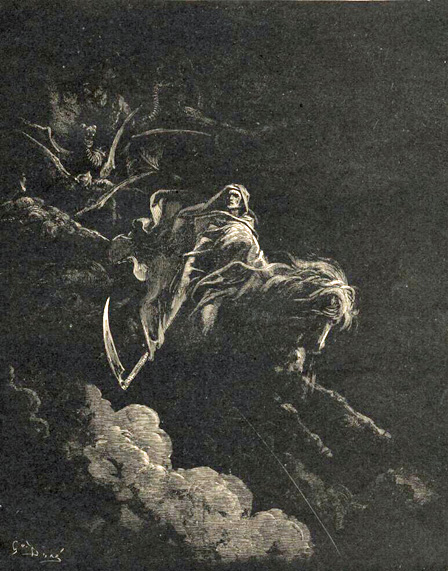
And I looked, and behold a pale horse: and his name that sat on him was Death, and Hell followed with him. And power was given unto them over the fourth part of the earth, to kill with sword, and with hunger, and with death, and with the beasts of the earth.
Revelation vi, 7-8
Source: A Gallery of Illustrations by Paul Gustave Dore
Return to Pagina Artis
Return to Bruce and Bobbie's Main Page.